

Should Engineers Get a PHD? 11 Truths!
Should engineers get a PhD? Depends on what you want to achieve in your career. There are ups and downs to pursuing a PhD in engineering.
To figure it out, start by asking yourself what kind of career you’re after. Your decision will be based on factors like:
- Your interests
- How much money you want to make
- The lifestyle you desire
- Your other career options
We’ll chat about these four pointers, and then dive headfirst into 11 extra tips to help you size up the pros and cons of pursuing a PhD in engineering.

Important Note: I’ll be generalizing each factor I discuss, so keep in mind that there are always exceptions. And don’t forget that some superstar engineers will fly high whether they have a PhD or not. Success can come either way!
What really interests you in engineering?
A PhD can give you a leg up when tackling groundbreaking technological challenges. Without one, you might find it tough to access such work. But if you’re into more typical engineering gigs in the industry, then a PhD won’t be worth the time and money.
Usually, people go for a PhD if they want to become a specialist or researcher, or if they have their sights set on an academic career. A PhD can provide flexibility between industry and academia, letting you explore fresh ideas and spearhead innovative projects.
Here’s my two cents on both academia and industry:
In academia
In this world, your work might not make an immediate real-world splash. It could take years or even decades for your research to be recognized and applied. So, if you’re looking to become an overnight sensation, you might want to think again.
But you know what? To a select few who are passionate about your field, your work will be a big deal. You’ll have the chance to share your unique ideas with like-minded folks and make a difference in your little corner of the world.
And never forget that every small step you take will ultimately contribute to the greater good of humanity.
In industry
Meanwhile, in the industry, your work can make an instant impact. You’ll tackle awesome projects that are directly tied to a company’s goals, making a real difference in people’s lives.
Take, for example, working on R&D for batteries. Batteries are essential for our future, and every tiny improvement can change our lives in a big way.
The downside? Your company might not give you the credit you deserve for your groundbreaking work. But don’t sweat it – there are loads of similar opportunities for PhD holders who are motivated and inventive.
All in all, whether you pick academia or industry, you’ll have plenty of chances to change the world. Just keep cranking out top-notch work, and everything else will fall into place.
How much money do you want to make?
First off, don’t pay for your PhD yourself. If you can’t get funding, it means the market doesn’t see the value in your research.
Even with funding, you might only make $20k to $40k a year, depending on your university. If you’d gone straight into the industry, you could be pocketing $150k or more each year. Then you could invest that salary in real estate, businesses, you name it.
So, if money’s your main concern, you’ll lag behind your peers who jumped straight into the industry. Because while you’re spending 3 to 5 years earning a PhD and living on ramen noodles, they’ll be making bank.
And if you’re thinking about academia after your PhD, buckle up for even more financial hurdles.
Let’s be real: a PhD is a massive investment of time and money. If dollar signs are all you see, don’t bother with a PhD.
Important Note: Engineers with PhDs who start multi-million dollar businesses are exceptions, just like college dropouts who start multi-billion dollar businesses.
PhD stipends from major U.S. universities
Check this shortlist of engineering department stipends from major universities, put together by PhD Stipends :
As you can tell, diving into a PhD in engineering might not make you rich overnight. But, hey, it does give you the chance to work on some mind-blowing research and help shape the world of tomorrow.
Important Note: Don’t forget to weigh in the cost of living when you’re checking out those PhD stipends. Higher stipends usually come with a heftier price tag on everyday life, like in the Bay Area where Stanford is nestled.
What type of lifestyle do you want?
Dreaming of a chill, easygoing life? Academia might not be your jam. You could grind away for years and never snag that elusive academic tenure. Even in the industry, you might land just an ordinary engineering gig, making your PhD feel like a waste.
The professional stress from this uncertain journey can seep into your personal life. Financial struggles might become your constant companion, impacting every corner of your life. But hey, with a PhD, you get the keys to the world’s coolest toys and can work in top-notch national labs and fancy universities.
If you’re down to embrace uncertainty into your golden years, a PhD could be worth the ride. You may trade short-term comfort for the shot at doing what sets your soul on fire in the long run.
Mind you, I use the term sacrifice lightly. If you’re head over heels for your research, nothing else will even matter.
Do you have other options in life?
If you’re still feeling the PhD vibe after all this, ask yourself:
- Do you have any other career options?
- Is there another gig that’s tugging at your heartstrings?
If you said yes to either, hold your horses! Give some serious thought to whether a PhD is really your destiny. I’ve got friends who ditched their PhD programs to start businesses, and now they’re swimming in millions!
On the flip side, I know folks who chased a PhD just to immigrate to the US for a better life. But listen, don’t just follow the crowd. Committing to a PhD is a massive deal and can change your life in a big way.
This is further highlighted by the low number of U.S. students going for a PhD in engineering each year. The data below, from ASEE , includes all engineering fields combined.
Important Note: The number of awarded engineering doctorate degrees is increasing. But the U.S. population is also increasing, and more foreign students are immigrating to the U.S. to pursue a PhD.
11 Pointers to consider in pursuing a PhD in engineering
Now, here are 11 pointers I’ve gathered from my pals and relatives who’ve gone down the PhD-in-engineering rabbit hole:
#1 Choose a research topic with real-world oomph
Picking the perfect research topic is the key to unlocking your PhD’s potential. Focus on fields that are shining bright, like:
- Artificial Intelligence (AI)
- Renewable energy
These areas tend to reel in more funding and have a higher demand in both academia and industry. After all, you still gotta pay the bills and keep a roof over your head.
#2 A PhD hones your thinking skills, not just your specialization
In the real world, you might not use all that fancy research know-how from your PhD. Instead, you’ll rely on your shiny new way of thinking to tackle problems.
So, a PhD isn’t just about becoming the go-to person in a super-niche field. It’s also about learning how to think and tackle the tough stuff.
And, hey, you can pick up these skills outside the hallowed halls of academia too.
#3 Don’t expect a PhD to put you on a pedestal
Sure, a PhD might make some folks go “ooh” and “aah,” but at the end of the day, it’s all about delivering the goods. Your skills and passion for the job are what really count, not the alphabet soup trailing your name.
I’m all about treating everyone equally, regardless of their academic fanfare.
Of course, a PhD can give you a credibility boost when making first impressions. But remember, it’s what you do next that really matters.
#4 A PhD can open doors, but it might close some too
A PhD can help you score high-level gigs at big-shot companies with in-house research and development. But beware – it might also slam some doors shut if you’re deemed overqualified for certain roles.
Choose your career path wisely and take time to think through your future pragmatically.
#5 Dive into a PhD in a subject that ignites your passion
Being passionate about your subject is the secret sauce to staying motivated during your PhD journey. Surround yourself with amazing people who share your interests, or you’ll struggle through the tough times – and trust me, there’ll be plenty.
#6 Don’t chase a PhD for the wrong reasons
Don’t go after a PhD just because “it’s what smart people do” or because you want to add some extra letters to your name.
Let’s get real here: a PhD doesn’t magically transform you into a genius. Heck, some of the brightest minds out there never even set foot in a college classroom!
If you were a regular Joe or Jane before diving into a PhD program, chances are you’ll still be one when you’re done. But hey, you don’t need to be a mega-brainiac to tackle a PhD. If you can snag a spot in a program, you’ve definitely got what it takes to see it through.
#7 Fear not the PhD pursuit
Some folks are scared stiff of the grueling trek to PhD-land. It’s like climbing a never-ending mountain, right?
Well, anything worth chasing is gonna be tough. If it were a piece of cake, everybody and their dog would be doing it!
#8 A PhD isn’t for everyone
To nail that PhD, you need a killer work ethic and a fierce dedication to your field. That’s what’ll help you conquer those hurdles and push through the lonely stretches.
Let’s face it: the PhD life isn’t everyone’s cup of tea. Just look at the small number of doctorates awarded each year in the U.S., as reported by ASEE. The data below covers all engineering fields combined:
And if you’re bold enough to take on a PhD, you’re probably an ambitious go-getter. So you’ll no doubt find some other epic challenge to sink your teeth into.
#9 Pick your program and advisor like a pro
The right program and advisor can make or break your PhD ride.
Seriously, you’ll be bending over backward for your advisor for years. They’ve got the power to make your life a living nightmare. Keep your eyes peeled for these red flags:
A bad advisor:
- Is a grade-A jerk
- Makes everything about them
- Squeezes you for free labor and grinds you down
- Fills you with guilt and doubt
A good advisor:
- Is super nice and supportive
- Turns you into a top-notch researcher
- Dishes out awesome life advice
- Hooks you up with conferences and fellowships
- Lets you visit other labs
So do your homework and pick your program and advisor with care.
#10 Weigh the impact on your loved ones
I’ve known people who juggled family life and a PhD. Sure, it was a bumpy road, but they made it work.
Keep in mind that a PhD can take ages, and your biological clock won’t wait around for you to finish.
#11 Industry jobs for PhD grads
Dreaming of a PhD to score an industry job? From what I’ve seen, here are a couple of paths for PhD graduates:
- Work in well-funded government labs, doing the research thing.
- Join big-league companies like Google, Apple, or IBM that can afford to splash cash on research.
If that doesn’t float your boat, a Master’s degree might be all you need for other engineering gigs in the industry.
Important Note: During recessions, R&D departments usually hold steady. R&D is a long-haul investment for a company, after all.
If an R&D project kicks off during a slump, it’ll wrap up just as the economy bounces back. That way, the company comes out stronger on the other side.
“Should engineers get a PhD” wrap up
Deciding to pursue a PhD is a deeply personal choice that deserves some serious soul-searching.
Don’t let peer pressure sway you. Take a good, hard look at the pros and cons, and make the call that’s right for you.
Now, I’ve met engineers who’d never trade their PhD experience for the world. But others reckon it was the worst decision they ever made.
At the end of the day, a PhD is all about the journey, not just the fancy certificate and those three little letters you get to tack onto your name.
Do you think a PhD in engineering is worthwhile? Will it be even more valuable down the road?
SUBSCRIBE TO ENGINEER CALCS NEWSLETTER

Author Bio: Koosha started Engineer Calcs in 2019 to help people better understand the engineering and construction industry, and to discuss various science and engineering-related topics to make people think. He has been working in the engineering and tech industry in California for well over 15 years now and is a licensed professional electrical engineer, and also has various entrepreneurial pursuits.
Koosha has an extensive background in the design and specification of electrical systems with areas of expertise including power generation, transmission, distribution, instrumentation and controls, and water distribution and pumping as well as alternative energy (wind, solar, geothermal, and storage).
Koosha is most interested in engineering innovations, the cosmos, sports, fitness, and our history and future.
6 thoughts on “Should Engineers Get a PHD? 11 Truths!”
The most insightful comparison I’ve found on this topic so far. Thank you.
Glad you found the article helpful 🙂
Thanks for that nicely summed up article – not too long and covers the important points on everybody’s mind! 🙂
Glad you enjoyed the read 🙂
Thank you, I have just been searching for info about this subject for ages and yours is the best I have found out till now. However, what in regards to the conclusion? Are you positive about the source?
I tried to capture all angles of the experience, so do your best to apply the lessons to your personality and reasons for pursuing the degree.
Leave a Comment Cancel reply
Save my name, email, and website in this browser for the next time I comment.
- Industry Partners
- Aerospace & Automotive
- AI, Machine Learning, IoT & Data Science
- Biotechnology & Healthcare
- Building, Design & Construction
- Business, Management & Consulting
- Cybersecurity
- Electrical & Electronics
- Energy & Sustainability
- Entrepreneurship & Startup
- Government & Non-Profit
- Manufacturing & Materials
- Research & Academia
- Biomedical Engineering
- Computer Science & Engineering
- Electrical & Systems Engineering
- Energy, Environmental & Chemical Engineering
- Mechanical Engineering & Materials Science
- Greater St. Louis Region
- Women & Engineering
- Multicultural
- Featured Jobs
Should You Get Your PhD in Engineering?
- Share This: Share Should You Get Your PhD in Engineering? on Facebook Share Should You Get Your PhD in Engineering? on LinkedIn Share Should You Get Your PhD in Engineering? on X
Is it worth it to continue the academic track towards an engineering PhD, or are you be better off going into the industry, paying back those student loans? The answer depends on what you want from your engineering career.
Do You Enjoy Research?
The greatest advantage of the PhD is that it gives you experience in carrying out detailed research. Your Master’s and Bachelor’s degrees are focused on learning things that are already known, but the PhD teaches you to find out new things, to carry out experiments, to report data, and learn from your mistakes.
Ideally, you become a subject matter expert in your chosen focus. That puts you in a great position for jobs that require that specific expertise, or where research skills are highly valued.
Preet Anand, CEO of technology company BlueLight , says that you need to think about what role you want. “A PhD is incredibly important for anyone involved with scientific innovation and research. However, if your aspirations are to be involved with implementation and quickly moving into the business side, a PhD is probably not effective from a time-ROI perspective. It’s especially not helpful if you’re working in software, where the speed of innovation in industry is quicker than the speed of academia.”
Forensic engineer Robert McElroy specializes in technical failure analysis related to automobiles, heavy trucks, and all types of industrial vehicles, and is an internationally recognized expert on the causes of industrial and transportation accidents. He stresses that his PhD has both commercial and technical benefits. “As a serial entrepreneur and forensic engineer, without the PhD, I could never have accomplished what I have been fortunate enough to achieve.”
An Engineering PhD Opens Doors…
Karen Thole, Department Head of Mechanical and Nuclear Engineering at Pennsylvania State University and member of the American Society of Mechanical Engineers , explains that the usefulness of PhDs in industry quite depends upon the industry itself. “Many high tech industries continue to develop “tools” to help their engineers determine better designs. The development of such tools generally requires a graduate level understanding. And, a company’s tools are what set apart the competition. For example, there are several companies that make gas turbine engines with the basic architecture being the same. What sets companies apart, however, are those that do their own tool development such as predictive codes, design codes, standard work practices, etc. As tools improve, it helps to advance technology and develop better engines. To improve the tools, however, it requires a high level of understanding of the physics, which is where PhDs come in. The more technologically advanced the company, the more it takes some sort of research center, which generally employs PhDs.”
“I have yet to find a jobless, homeless PhD in engineering.”
Naturally, this means that some industries have far more demand for PhDs than others. “The aerospace industries as well as the high tech electronics industries both look for PhDs,” says Thole. “They’re generally the ones which require ME and EE disciplines.”
David Gantshar, CEO of engineering recruiters Shepherd Search Group Inc. notes that the value of a PhD often depends on the character of the senior management. Companies founded or led by PhDs tend to have more respect for those who have been through the same academic training. “A PhD is highly valued in some circumstances and not necessary at other times,” he says. “For a vice president of engineering or another senior executive position, it can be a big plus, especially if the company president himself has a PhD. The PhD degree reflects intense and successful research and would be valued in an R&D environment. If the president of the organization has one, he/she will value those individuals that are “on par” academically and offer credentials similar to those around the table. However for a senior engineering or manager’s position, it is rarely required.”
… Unless It Closes Them
However, one problem faced by many PhDs is that they’re often regarded as “too academic,” and therefore not suited to the pace and pressures of commercial engineering.

Credit: NASA
Whether or not that’s true, it’s certainly a perception you have to battle with, as Gantshar notes. “It really depends on the organization. Some companies might see a Ph.D. as too research oriented and would identify the engineer as insufficiently hands-on. We have seen many instances where a PhD has actually worked against a candidate in these circumstances and the individual with less academic credentials is selected based upon these perceptions.”
What About Non-STEM PhDs?
If you’re thinking of going into the management role, then it may be worth considering a PhD which proves your business credentials. Combined with your engineering experience, it can give you a major advantage over other managers.
Sonja Fisher recently completed her PhD in business. “It has been very helpful,” she says, with evident pride. “I am getting opportunities left and right. I seem to be more in demand since getting my PhD.”
Should You Get Your PhD?
If you’re looking for a research role, a job requiring very specific expertise or a position in a company that’s known for innovation or R&D, then a PhD can pay great dividends. According to the latest Engineering Income and Salary Survey , on average, you’ll earn about 35% more than an engineer with a Bachelor’s degree – typically about $30,000 a year. That’s a huge payoff for those few years of research.
Equally importantly, a PhD will give you a level of job security that a lesser degree won’t give you. “I have yet to find a jobless, homeless PhD in engineering. That’s my simple answer,” grins Thole. Not only that, but it opens up new opportunities. “The PhD really allows you to tailor your own career a bit more. Generally companies want their PhDs to seek out new ideas and think bigger about the field. So, it presents more opportunities to do what you want.”
Source: Engineerjobs.com
Choose Between a Master's, Ph.D. in Engineering
A doctorate in engineering requires a love of research and patience for several years of challenging study.
Weigh a Master's, Ph.D. in Engineering

Students who pursue a graduate degree in engineering will be more competitive in the job market than those with just a bachelor's, experts say.
When it comes to employment, graduates with a bachelor's degree in engineering are on solid footing, relatively speaking. With high salaries and some of the best odds of finding full-time work , they can escape the career angst that often plagues their peers with freshly-minted English or history diplomas.
Still, many engineers may find themselves wondering what a graduate degree could do for their career.
"With the economy improving, significant numbers of job postings are now requiring higher levels of expertise," says Ken Little, senior graduate career development adviser at Georgia Institute of Technology . At the same time, high-tech jobs are becoming more globally competitive, drawing applicants from all over the world, he says.
Students looking to get a graduate degree in engineering can choose between a master's program and a Ph.D. It's a big decision, experts say, and one that can significantly affect a student's career.
Learn why engineers may be more
Before choosing what kind of graduate degree to pursue, students should think about what they want to do with their lives after graduation, experts say.
Master's degrees prepare students for careers in industry that don't have a research focus, says Babatunde Ogunnaike, dean of the college of engineering at the University of Delaware . "If you want to work in research either in industry or in academia or for a government research lab, you need to get a Ph.D.," he says.
Eddie Machek, who is earning a master's degree in civil engineering from the University of Akron and who will start a doctoral program in engineering at Georgia Tech this fall, explains the difference between the degrees this way: "At a bachelor's level you are going to go out and do what's been done. At the master's level you are going to be in charge of the people who are doing that stuff. In a Ph.D., that's a whole other thing because you are doing the new stuff. You are in a lab."
Master's degrees in engineering can be a great fit for recent graduates who want to specialize within engineering or for those already in the field who want to switch their focus, experts say. The degrees can be research-based, which is the more common option, or professional, which lack a research component.
“It opens the door for more specialized opportunities in the workforce," Craig Menzemer, associate dean for graduate studies and administration at the University of Akron, said through email. "For example, a civil engineer with a bachelor’s degree may be expected to do a variety of day-to-day tasks, but a civil engineering major with a master’s who specialized in structures will have opportunities to work on structural-specific projects."
Discover the
Aditya Srinath, who earned his master's in industrial engineering from Purdue University in 2014, says he opted for the credential because it helped him bolster his professional skills rather than research skills. "A master's strikes a good balance between having more education than a bachelor's and not as much as Ph.D but still having a more rounded-out profile," says Srinath, who works as a project engineer at 3M, which manufactures a wide array of products, including Post-it Notes.
Engineering Ph.D.s provide even more specialization than master's degrees, and a higher earning potential, but they also come with significant risks, experts say.
Research jobs within government labs and industry are quite competitive, and tenure-track faculty positions are notoriously hard to come by, says George Haritos, dean of the college of engineering at the University of Akron. What's more, sometimes employers in industry won't hire Ph.D.s because they fear they are overqualified and would have to pay them too much, he says.
Doctoral programs require students to put in a great deal of time and effort, experts say. Not everyone finishes the programs, and those who do are both gifted and passionate about their subject.
Scottie-Beth Fleming, who is earning a doctorate in aerospace engineering from Georgia Tech, says she enjoys the independence that comes with a Ph.D.
"With the master's, a lot of times, your research is driven by the government or someone who is giving money and there is an expectation of what you are going to do," she says. "In a Ph.D. you don’t have that expectation. You get to explore an area that maybe nobody else would explore."
Before making a final decision about what kind of advanced engineering degree to pursue, students should also look into the requirements of their field, says Susan Fisher, director of graduate programs at Purdue University's engineering school.
For example, chemical engineering and biomedical engineering have more employment opportunities for Ph.D. students, she says. Civil engineering, on the other hand, has more employment openings outside academia for those with master’s degrees than for those with doctorates.
One way students can gauge whether they are ready for a Ph.D is to take a few research-focused courses either in undergrad or while in a master's program, experts say.
"The goal is to find out what you are truly passionate about and find a good way to apply that to the world," Srinath says.
Searching for an engineering school? Get our complete rankings of Best Engineering Schools.
Tags: education , engineering graduate school , graduate schools , STEM education , STEM , students
You May Also Like
What to ask law students and alumni.
Gabriel Kuris April 22, 2024

Find a Strong Human Rights Law Program
Anayat Durrani April 18, 2024

Environmental Health in Medical School
Zach Grimmett April 16, 2024

How to Choose a Law Career Path
Gabriel Kuris April 15, 2024

Questions Women MBA Hopefuls Should Ask
Haley Bartel April 12, 2024

Law Schools With the Highest LSATs
Ilana Kowarski and Cole Claybourn April 11, 2024

MBA Programs That Lead to Good Jobs
Ilana Kowarski and Cole Claybourn April 10, 2024

B-Schools With Racial Diversity
Sarah Wood April 10, 2024

Law Schools That Are Hardest to Get Into
Sarah Wood April 9, 2024

Grad School Housing Options
Anayat Durrani April 9, 2024


- Majors & Careers
- Online Grad School
- Preparing For Grad School
- Student Life
Top 10 Best PhD in Engineering Programs [2024]

You could secure a relatively successful career with a bachelor’s or master’s degree in engineering, so why would you need a PhD in engineering? The prevalence of engineering doctorate graduates has steadily increased in the last 20 years by 6%. Maybe it has something to do with the fact that it’s one of the highest-paid PhD programs in 2024 !
A doctorate degree in engineering will equip you with advanced skills and knowledge, qualifying you for some of the highest positions in the sector, including unique research positions and esteemed professor roles.
With a doctorate of engineering, you’ll belong to a select group of professionals and enjoy a higher average salary than other engineers. Ready to take your engineering career to the next level? Check out our roundup of the best PhD engineering programs, along with career ideas and salary potential.
Table of Contents
Best PhD in Engineering Programs
Here’s a quick list of the best PhD in engineering programs:
- Washington University in St. Louis – PhD in Biomedical Engineering
- Duke University – Ph.D. – Civil & Environmental Engineering
- George Washington University – Doctor of Engineering in Engineering Management
- University of Missouri – Ph.D. in Biological Engineering
- University of Georgia – Ph.D. Engineering – Electrical and Computer Engineering
- Northeastern University – Ph.D., Mechanical Engineering
- Lehigh University – Ph.D. in Computer Science and Engineering
- University of Wisconsin – Chemical Engineering, Ph.D.
- Clemson University – Ph.D. in Mechanical Engineering
- Georgia Institute of Technology – Doctor of Philosophy in City and Regional Planning
Washington University in St. Louis, McKelvey School of Engineering
PhD in Biomedical Engineering

Named after George Washington, Washington University is a prestigious private research university with students from all 50 states as well as 120 countries. It has two campuses, one each in St. Louis and Clayton, Missouri.
If you have an undergraduate degree in a STEM discipline, you can apply for the university’s PhD in Biomedical Engineering program. As part of this fully-funded program, you’ll conduct research in one of the seven interdisciplinary frontier areas in biomedical engineering.
- Courses : Problem-based learning in biomedical sciences, mathematics of image science, and bioelectric phenomena.
- Credits : 72 (Post-bachelor’s)
- Duration : 5 years
- Tuition : $57,750 per year
- Financial aid : Fellowships
- Acceptance rate: 16%
- Location : St. Louis, MO
Duke University, Pratt School of Engineering
Ph.D. – Civil & Environmental Engineering

Duke University is a world-renowned private research university spread across a number of campuses that offers a diverse learning environment. This PhD program offers cross-disciplinary research opportunities, with the choice of one of five different research tracks available:
- Hydrology and Fluid Dynamics
- Environmental Health Engineering
- Computational Mechanics and Scientific Computing
- Engineering Environmental Geomechanics and Geophysics
- Systems, Risk, and Decision
Students are also eligible for full funding if they meet all requirements.
- Courses : Depends on the track, but some examples include chemical principles, advanced fluid mechanics, uncertainty qualification, game theory, and environmental microbiology
- Credits : 30
- Financial aid : Full funding, fellowships, awards
- Acceptance rate : 7.7%
- Location : Durham, North Carolina
The George Washington University
Doctor of Engineering in Engineering Management

George Washington University offers a doctoral program in Engineering Management with five different focus areas. Focus areas include crisis, emergency & risk management, engineering & technology management, and knowledge & information management. An online engineering PhD option is also available.
- Courses : Data analysis for engineers & scientists, the Praxis Proposal, and Praxis research.
- Credits: 45
- Tuition: Refer to the tuition page
- Financial aid : Scholarships, federal work-study, loans
- Acceptance rate : 43%
- Location: Washington, DC
The University of Missouri, College of Engineering
Ph.D. in Biological Engineering

The University of Missouri is a world-renowned public university offering more than 300 programs to students from all 50 states as well as 100 countries. Its PhD in Biological Engineering allows you to conduct research in interdisciplinary fields that combine subjects from both biological sciences and engineering. You’ll need to pass a qualifying examination after the first 18 months to continue in the program.
- Courses : Numerical methods in engineering research, seminar in biological engineering, and research in biological engineering.
- Semester hours : 72
- Tuition : $229.80
- Financial aid : Loans, scholarships fellowships, and assistantships
- Acceptance rate: 81.8%
- Location : Columbia, MO
The University of Georgia, College of Engineering
Ph.D. Engineering – Electrical and Computer Engineering

The University of Georgia is a public land grant research university in Athens, Georgia. Its PhD program in engineering allows for in-depth research into electrical and computer engineering technologies and investigates related advanced applications. You can apply to the program with only a bachelor’s degree, but you will have to complete additional credits.
- Tracks : Robotics & automation, electronics & photonics, and intelligent & cyber-physical systems
- Courses : Wireless sensor networks, advanced microcontrollers, and engineering informatics.
- Credits : 43 (for master’s degree holders), 73 (for bachelor’s degree holders)
- Tuition : $8,704 per year
- Financial aid : Research assistantship, grants, scholarships, loans, federal work-study, veteran benefits
- Acceptance rate: 48.4%
- Location: Athens, GA
Northeastern University, Department of Mechanical & Industrial Engineering
Ph.D., Mechanical Engineering
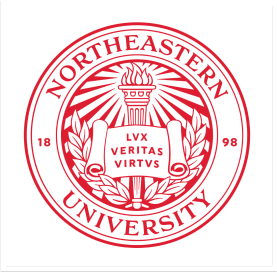
Northeastern University is a private research university in Boston. Its PhD program in Mechanical Engineering offers two modes of entry: direct entry for students with a bachelor’s degree and advanced entry for those with a master’s degree. You can also combine the program with the Gordon Engineering Leadership certificate.
- Courses : Materials science engineering, dynamic systems and control, and finite element method (FEM).
- Credit hours : 40 minimum (direct entry), 20 minimum (advanced entry)
- Tuition : $1,689 per credit hour
- Financial aid : Scholarships, fellowships, assistantships, awards, and loans
- Acceptance rate: 20.5%
- Location: Boston, Massachusetts
Lehigh University, P.C. Rossin College of Engineering & Applied Science
Ph.D. in Computer Science and Engineering

Located in Pennsylvania’s Lehigh Valley, Lehigh University is a world-renowned private research college with a special focus on interdisciplinary research, with a collaborative approach. This PhD program allows you to explore state-of-the-art computer science fields such as artificial intelligence, robotics, and social computing. You’ll also have access to interdisciplinary studies through other departments within the institution, as well as other universities and external laboratories.
- Courses : Advanced programming techniques, Artificial Intelligence theory & practice, and design & analysis of algorithms.
- Duration : 4-6 years
- Tuition : $1,500 per credit hour
- Financial aid : Research assistantships, teaching assistantships, fellowships
- Acceptance rate : 49.5%
- Location : Bethlehem, PA
University of Wisconsin – Madison, Department of Chemical and Biological Engineering
Chemical Engineering, Ph.D.

The University of Wisconsin is a public land-grant research university and the flagship university of the University of Wisconsin System. Its PhD program in Chemical Engineering has been among the most prestigious such programs for more than a century. The school conducts research in a wide range of subjects, such as energy-related science and technology, complex fluids, polymers synthesis and processing, and atomic-scale design of surface reactivity.
- Courses : Advanced chemical engineering thermodynamics, and biological engineering: molecules, cells & systems.
- Credits : 51 minimum
- Tuition : $773 per credit
- Financial aid : Loans, scholarships, grants, federal work-study, veteran benefits
- Acceptance rate : 57.2%
- Location: Madison, WI
Clemson University, Department of Mechanical Engineering
Ph.D. in Mechanical Engineering

Clemson University is a private land grant university with a range of research projects in agriculture, energy, and engineering, among other fields. This PhD program includes a thesis and a non-thesis option. You’ll have the opportunity to conduct research at various renowned institutes, including the Dominion Energy Innovation Center (EIC) of Clemson University. You can transfer a maximum of 12 credits from your graduate coursework.
- Courses : Foundations of fluid mechanics, intermediate dynamics, modern control engineering, and design methodology.
- Credit hours : 24 (with thesis), 33 (non-thesis)
- Tuition : Refer tuition page
- Financial aid : Grants, scholarships, loans, student employment, etc.
- Acceptance rate : 61.9%
- Location : North Charleston, SC
Georgia Institute of Technology, School of City & Regional Planning
Doctor of Philosophy in City and Regional Planning
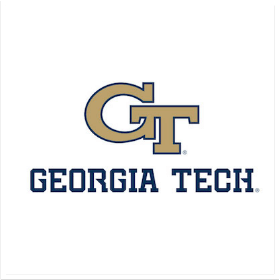
Georgia Institute of Technology, or Georgia Tech, is a well-known university with a core focus on technology. Its PhD in city and regional planning is a specialized doctorate of engineering program that allows you to work with other research centers, schools, and programs. Core subjects include the construction of healthy cities, disaster planning, urban analytics, and climate change.
- Courses : Advanced planning theory, quantitative research design & methods, and advanced urban and regional development theory.
- Credits : 46
- Duration : 2 years minimum
- Tuition : $586 per credit
- Financial aid : Research assistantships, scholarships, loans, and fellowships
- Acceptance rate : 21.3%
- Location : Atlanta, GA
Why Get a Degree in Engineering?
An engineering degree teaches you to look at the most modern, advanced, innovative, and constructive parts of the world. With an advanced degree in the field, you’ll gain problem-solving, analytical and critical thinking, development, and creative skills.
Furthermore, a PhD in Engineering will qualify you to apply for some of the most lucrative jobs in the industry. You will have several capabilities enabling you to take up almost any kind of project.
Top Careers for PhD in Engineering Graduates
Here are some of the jobs you’re most likely to score with an engineering PhD, along with the annual median salary for each:
- Engineering Manager ( $118,900 )
- Research Engineer ( $83,112 )
- Engineering Professor ( $89,213 )
- Design Engineer ( $69,821 )
- Aerospace Engineer ( $86,034 )
- Chemical Engineer ( $76,689 )
- Test/QA Engineer for Computer Software ( $71,633 )
Scholarships for Engineering PhD Programs
Many universities offer a range of scholarships, fellowships, and awards to deserving doctorate candidates.
Here are some of the scholarships offered by the country’s most prestigious universities:
- Sloan Scholarships: You’ll need US citizenship and admission to one of Duke University’s PhD programs to be eligible. Scholarship recipients receive $40,000 over five years.
- University of Missouri 5-Year Fellowship Programs: The University of Missouri offers seven fellowship programs for eligible students admitted to the university’s doctoral programs. The program includes a tuition waiver, five years’ support, and an insurance subsidy.
- Dean’s International Award : Washington University in St. Louis awards this scholarship to candidates applying to their PhD engineering programs and are currently pursuing an undergraduate or master’s program.
- Northeastern University Dissertation Completion Fellowship: Eligible doctoral students at Northeastern University may be awarded a stipend for their final semester.
- Regent’s Opportunity Scholarship : This is a renewable scholarship of $5,500 per year offered by the Georgia Institute of Technology for minority in-state students.
Related: Top Online PhD Programs in 2024
PhD in Engineering FAQs
Is a phd useful in engineering.
A doctorate degree in engineering can attract a higher salary than a master’s alone. Additionally, a PhD in engineering opens more opportunities to do innovative projects and grow your career.
What is the Best PhD in Engineering?
There is no single best PhD engineering program. The best program for you depends on your preferred discipline, schedule, and goals. Once you decide your focus, look for reputable, accredited universities offering the best engineering PhD programs in your desired specialty.
What is the Highest Degree in Engineering?
A PhD is considered the highest degree in engineering. This qualification will help you secure roles at the highest levels of the industry.
How Long is a PhD in Engineering?
A typical PhD in engineering takes between five and seven years to complete. However, this can vary depending on the program, your own preferences, and requirements. For example, there are online engineering PhD programs and accelerated programs that you can complete more quickly.
What Percentage of Engineers have a PhD?
Not all engineers have a doctorate, but those who do are at an advantage. According to Forbes , the proportion of engineering doctorates among all PhD holders increased from 12.9% to 18.9% from 2000 to 2020. Additionally, over 11,000 engineering doctorates were awarded in 2019.
Key Takeaways
Not many engineers pursue a doctorate after their master’s — but doing so will put you in a competitive position. You’ll be equipped with high-level research skills that will set you apart from your colleagues.
A PhD in engineering will give you an advanced level of knowledge that will propel your performance in your current role, prepare you for promotion and more leadership roles, and equip you to take on the most challenging assignments in the industry. On top of all that, you’ll be rewarded with a lucrative salary.
If you’re ready to put together your applications for the best engineering PhD programs, check out our guides to writing your academic resume and how to ask a professor for a letter of recommendation.
You May Also Like:
- Top 20 Best PhD Programs in California [Online and On-Campus]
- Top 10 Best Online PhD Programs in Texas

Lisa Marlin
Lisa is a full-time writer specializing in career advice, further education, and personal development. She works from all over the world, and when not writing you'll find her hiking, practicing yoga, or enjoying a glass of Malbec.
- Lisa Marlin https://blog.thegradcafe.com/author/lisa-marlin/ 12 Best Laptops for Computer Science Students
- Lisa Marlin https://blog.thegradcafe.com/author/lisa-marlin/ ACBSP Vs AACSB: Which Business Program Accreditations is Better?
- Lisa Marlin https://blog.thegradcafe.com/author/lisa-marlin/ BA vs BS: What You Need to Know [2024 Guide]
- Lisa Marlin https://blog.thegradcafe.com/author/lisa-marlin/ The 19 Best MBA Scholarships to Apply for [2024-2025]
Top 10 Best Online DBA Programs in 2024
Top 10 best 1-year phd programs online, related posts.

- Applying to Big Tech This Year? Here’s How to Ace It.

- 73% of job seekers believe a degree is needed for a well-paying role–but is it?

Tech Talent Crunch: Cities with More Jobs Than Workers

The Most Under-Rated Career Advancement Tip for 2024

Top 5 Best Psychology PhD Programs in 2024

Good News For Early Careers: Skills-Based Hiring is Surging

Leave a Reply Cancel reply
Your email address will not be published. Required fields are marked *
Save my name, email, and website in this browser for the next time I comment.
Recent Posts
- 12 Best Laptops for Computer Science Students
- Is a Master’s Degree Worth It? [2024 Guide]
- Graduate Certificate vs Degree: What’s the Difference? [2024 Guide]

© 2024 TheGradCafe.com All rights reserved
- Partner With Us
- Results Search
- Submit Your Results
- Write For Us

- Aimlay Foundation
- Pharma Courses
- Become a Partner
- Medical Courses
- Life@Aimlay
- Web Stories

- Thesis Writing
- Law Admission
- Dissertation
- Honorary doctorate
- Educational Academy
- Management Courses
- Research Paper Writing
- YouTube Journal
PhD | Thesis Writing | Law Admission | Dissertation | Biography | Pharma | Honorary doctorate | Educational Academy | Management Courses | Research Paper Writing | YouTube Journal
How to Know If You Should Get a PhD in Engineering?
- February 28, 2022
- One Comment

A PhD degree in engineering is a must! It opens many opportunities for you and your career. For instance, a PhD gives you the ability to start-up research programs, gain experience with new technologies, and become an expert in your field of study. A faculty position is also easily attainable with a PhD . Engineering positions are always highly competitive so having your PhD will set you apart from the rest.
Having a PhD in engineering is one of the most prestigious titles out there. You’re by far better off with one than without one. the benefits of having a PhD in engineering are numerous and can affect almost every aspect of your life.
Why is a PhD in Engineering important?
PhD s are important for the economy. A PhD degree is a research degree and one of the main things that academia contributes to the world is new knowledge. A PhD in Engineering helps to teach people how to do research and to make discoveries. Companies like Google employ a lot of PhDs to help them stay on top of their game and keep innovating.
As an engineer, you need to know how to solve problems. You will encounter a lot of problems in your research and studies, can also encounter problems in your job or career.
The main part is to know how to find a good problem to work on. This requires some effort and practice. The more you work on finding problems, the better you become at it.
You need to know how to solve problems. Solving a problem requires understanding and creating models of the problem you are trying to solve and using these models. To create solutions that are easy to explain, implement and maintain.
Do you need a PhD to get hired by a good company with nice benefits?
It depends on your specialisation within the engineering field. If you hold a PhD in electrical engineering . There are chances to get hired as a senior research scientist at a major tech company (like Facebook, Microsoft, Amazon).
What skills do you require to have a PhD in Engineering?

If you have your heart set on a career in research and development, then a PhD in engineering is the way to go. Interested to teach at a university, then it will also be very useful. You have to be way more technical around subjects and have a passion to dig deep.
What are my career options with an engineering PhD?
If you’re considering a PhD in engineering , you may be curious about what your career options are after graduation. Let’s look at some possible careers and the types of jobs available to those with an engineering doctorate.
Engineering Education
Perhaps the most common option for those with a PhD in engineering is to enter academia as a professor. However, this represents only one aspect of education as a career option. Other jobs include curriculum development and research for companies that produce instructional materials and educational software.
Engineering Research and Development
PhD programs in engineering – Because it allows them to focus on the types of problems they enjoy solving or have experience in solving during their academic career.
If you’re interested in this type of job, you might consider working as an R&D engineer for a company or specializing in a particular area like biotechnology or nanotechnology as a researcher with an academic institution or government entity.

Engineering Management Careers
A PhD in engineering may also help you advance your managerial role. Your current knowledge may not be enough to help you achieve your goals.
A PhD in engineering management can make you more marketable in today’s competitive industry. It can also help you navigate the advanced concepts of managing people and projects both at present and in the future.
Can I have an engineering PhD and still start my own business?
Yes it is possible:, there are several ways to do it:.
- The most straightforward way is to be in a field where you can start your own business right after your PhD Program .
- The second way is with Aimlay. Aimlay offers services preferably for working professionals who are willing to complete their PhD Degree while working their jobs. We help you every step of the way. We make it easier for you, where you can use your free time with your research.
- The third way is to join a startup as an employee. Then try to get into the top management of the company over time. This can take a long time and may or may not happen depending on your skills and luck.
- The fourth way is to join a research organization and then use your connections there to find clients for your own. This can also take a long time, but it’s easier because you don’t need any money or other resources as such. Just connections with researchers and/or clients, which you can get through working in a research organization itself.
So, my advice would be that if you want to start your own business soon, then think of an idea while you’re doing your PhD (preferably before starting it). That you can develop during your PhD itself and then implement soon after getting your PhD without needing much external help or capital investment.

When deciding whether or not to pursue a PhD degree, remember that the field is far broader than the academic world. Engineers work in many industries, and a PhD is only one path. Confidence in your engineering background and technical skills is crucial when applying for positions away from academia. Employers will be impressed by your technical prowess, and if you can prove that you are an effective researcher when faced with challenges, then you are showing them how you can bring something new to the table as well. If and when you embrace your career, remember that life doesn’t end at five years out of school: there is always more to do, more to learn and more to contribute.
Share this Article
Send your query, 1 thought on “how to know if you should get a phd in engineering”.
What is the eligibility criteria for pursuing a PhD in engineering degree?
Leave a Reply Cancel reply
Your email address will not be published. Required fields are marked *
Save my name, email, and website in this browser for the next time I comment.
Skip to Content
PhD students earn top National Science Foundation fellowships
The national awards recognize and support outstanding grad students from across the country in science, technology, engineering and mathematics (STEM) fields who are pursuing research-based master’s and doctoral degrees.
PhD students Caleb Song and Jennifer Wu are each receiving the honor for 2024. Find out more about their research below. Awardees receive a $37,000 annual stipend and cost of education allowance for the next three years as well as professional development opportunities. PhD student Alex Hedrick also received an honorable mention from the National Science Foundation program.
2024 GRFP Honorees

2nd Year PhD Student
Advisor: John Pellegrino Lab: Membrane Science & Technology
I did my undergrad in Electrical Engineering at Georgia Tech before coming to Boulder for my PhD in Mechanical Engineering. For the past two years, I've been working on the characterization, tuning, and scale-up of graphene-based membrane electrodes (grMEs). The funding from the GRFP will allow me to pursue low technology readiness level (TRL) electrochemical device development using these grMEs. In particular, I plan on exploring hybrid electrophoretic/size exclusion-based separations for biopharmaceutical development and processing.
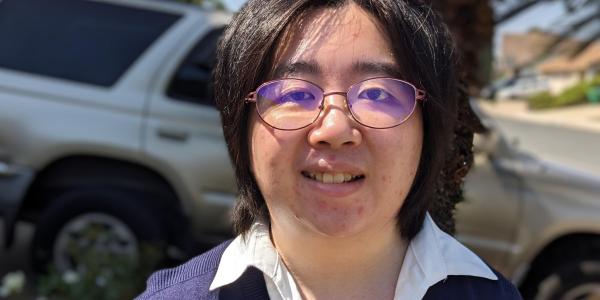
Jennifer Wu
Fall 2024 Incoming PhD Student
Advisor: Daven Henze Lab: Henze Group
My research will involve using computer simulations and environmental observations to investigate the impact of atmospheric constituents on air quality and climate change. By coupling satellite observations with state-of-the-art air pollution models, I aim to provide more accurate estimates of emissions to better inform climate and public health policy. Previously at Caltech, I worked closely with scientists at NASA's Jet Propulsion Laboratory in analyzing methane and carbon monoxide measurements in the Los Angeles Basin.
- Graduate Students
- Graduate Student Research
- Share via Facebook
- Share via Twitter
- Share via LinkedIn
Apply Visit Give
Departments
- Ann and H.J. Smead Aerospace Engineering Sciences
- Chemical & Biological Engineering
- Civil, Environmental & Architectural Engineering
- Computer Science
- Electrical, Computer & Energy Engineering
- Paul M. Rady Mechanical Engineering
- Applied Mathematics
- Biomedical Engineering
- Creative Technology & Design
- Engineering Education
- Engineering Management
- Engineering Physics
- Integrated Design Engineering
- Environmental Engineering
- Materials Science & Engineering
Affiliates & Partners
- ATLAS Institute
- BOLD Center
- Colorado Mesa University
- Colorado Space Grant Consortium
- Discovery Learning
- Engineering Honors
- Engineering Leadership
- Entrepreneurship
- Herbst Program for Engineering, Ethics & Society
- Integrated Teaching and Learning
- Global Engineering
- National Center for Women & Information Technology
- Mortenson Center for Global Engineering
- Western Colorado University

Online Students
For All Online Programs
International Students
On Campus, need or have Visa

Campus Students
For All Campus Programs
Is a University Degree Worth It?

Understanding the Numbers When reviewing job growth and salary information, it’s important to remember that actual numbers can vary due to many different factors — like years of experience in the role, industry of employment, geographic location, worker skill and economic conditions. Cited projections do not guarantee actual salary or job growth.
A university degree can prepare you for entry-level roles, a new career or help you advance in your current field. The potential to earn a higher salary and lower unemployment rates are just a couple of reasons why pursuing a degree is worth it, according to the United States Bureau of Labor Statistics ( BLS ).*
Other benefits of a college degree include:
- A broader range of job prospects
- Expansion of your professional network
- Personal growth
Depending on your goals, completing a degree could mean earning an associate, bachelor’s, master’s or doctorate degree:
- Associate degrees typically require 60 credits of coursework, or the equivalent of 20 college courses. They can take up to two years to complete, although some students can finish more quickly. Find out if an associate degree is worth it .
- Bachelor’s degrees require 120 credits of coursework and can take up to four years to complete. Explore the benefits of a bachelor's degree .
- Master's degrees are graduate-level degrees that help you build advanced expertise in your industry or prepare you for a new career. They typically take two years to complete, but the timeframe varies depending on the number of credits in your program and the number of classes you take each term. Determine whether you should get a master's degree .
- Doctoral or professional degrees signal your expert knowledge in a field and can include the Doctor of Philosophy (PhD) or the Doctor of Education (MEd). Is a doctorate degree worth it? Consider your personal and professional goals .
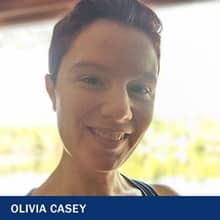
Thanks to the flexibility provided by the different types of programs and degree options available, you can often balance work and personal responsibilities with your coursework.
Even if it's been years since you've learned in a classroom setting, your education can often be tailored to your schedule and needs , said Olivia Casey, MEd , admission lead at Southern New Hampshire University (SNHU).
"I speak with adult learners coming back to school after being out of the classroom for a long time, and their biggest fear is they can't do it," she said. "But you can. Education is for everyone: there's no right or wrong time to start a degree."
Can You Earn More Money With a Degree?
No matter what degree you complete, the data shows it still pays to advance your education. A degree resulted in higher median weekly salaries for workers in 2023, BLS reports:
- Those with associate degrees earned a median of $1,058 per week, or 17.7% more than high school graduates who earned just $899 weekly.*
- Individuals with bachelor’s degrees earned a median weekly salary of $1,493, while those with master’s degrees earned $1,737.*
- Holders of doctorates or professional degrees enjoyed weekly median salaries of $2,109 and $2,206, respectively.*
It's important to remember that these numbers represent an average and could vary widely depending on your job, field, employer, major, geographic location and degree type.
A University Degree Pays Off in Personal Satisfaction
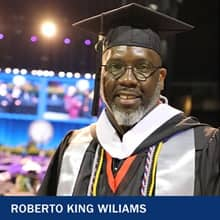
His organization aims to serve as a “resource broker” for veterans seeking assistance. He credited his university experience for giving him the tools to bring his dream to life and set an example for others in his community.
“A lot of young kids look up to me, and I try to counsel as many people as I can, encourage them to be a better person," Williams said. "Hopefully, I can get an opportunity to motivate more people through my actions and the things I've learned through the program.”
Find Your Program
Does a degree still have value to employers.
While some companies are dropping or loosening their degree requirements in favor of skill-based hiring, a recent study from Harvard Business School and The Burning Glass Institute have found that employers haven't changed their actual hiring behavior ( PDF Source ).
A report from Georgetown University’s Center on Education and the Workforce also projects that, by 2031, 72% of jobs in the country will require a degree or some sort of post-secondary training. Of those jobs, 29% will require some college or an associate degree and 42% will require a bachelor’s degree or higher.
A university degree is worth it because it shows employers that you have the technical skills and the “ soft skills ” needed to be successful in your role. According to a recent LinkedIn study , some of the skills employers most often look for in candidates include problem-solving skills, the ability to learn new things, analytical skills and the ability to communicate clearly.
If you’re concerned about future employment, BLS data shows that having a degree decreased the risk of unemployment for people in 2023.*
Workers with an associate degree had a 2.7% unemployment rate, those with a bachelor’s degree had a 2.2% unemployment rate and those with a master’s degree had a 2% unemployment rate, according to BLS.* Those with only a high school diploma had a 3.9% unemployment rate, BLS reported.*
What Degrees are Employers Looking For?
Employers are looking for candidates with degrees and majors that will prepare them to apply their critical thinking and technical skills on the job. According to the U.S. Census Bureau , in 2022, the top five most common degree fields were:
- Business management and administration
- General business
While engineering, computer science and other STEM degrees didn't make the top five majors list in 2022, the National Center for Education Statistics in 2021 reported that 5% and 3% of college degrees were awarded in these majors, respectively.
Some of today’s most in-demand jobs can be found in these sectors, and earning a degree can make you attractive to employers.
In 2023, STEM workers earned a median annual salary of $101,650, according to BLS.* Some roles, such as information security analyst, which typically require a bachelor’s degree in computer science , are expected to grow a whopping 32% within the next decade, BLS reported.* Computer and information systems managers, who also typically hold bachelor’s degrees, earned a median salary of $169,510 in 2023, according to BLS.*
Healthcare
Depending upon your major and degree, you can prepare yourself for roles such as health information technologist, registered nurse or nurse practitioner. In 2023, according to BLS, health information technologists, who typically enter the field with an associate degree, earned $62,990 , whereas registered nurses earned an average median salary of $86,070 .*
Business and Management
Individuals working as bookkeeping , accounting and auditing clerks, who typically enter the field with an associate degree, made a median annual salary of $47,440 in 2023, BLS reports.* Administrative and facilities managers, who typically enter the field with bachelor’s degrees, earned an average median salary of $104,900 , according to BLS.*
A Master of Business Administration (MBA) degree can further position you for management roles in several areas of business, including human resources, information systems marketing and operations, to name a few. According to a 2023 report, employers that took part in a survey administered by the Graduate Management Admission Council projected 2023 starting salaries for MBAs to be a median of $125,000, compared to $75,000 for those with bachelor’s degrees ( GMAC PDF source ).*
Regardless of your degree or field of study, you'll acquire valuable skills that will enhance your appeal to potential employers.
It's Never Too Late to Pursue Your Degree

Just a few months into the program, she secured an HR generalist job at a small manufacturing company and began working with her supervisor to grow into a future management position . Woodard credited the university's accessibility team and advisors for regularly checking in with her on her progress, which helped her reach the finish line.
"I wish I could've done it earlier, but I don't regret any steps I did or didn't take," Woodard said. "Timing is different for everyone, so if you're thinking about going back to school, do it when it's right for you."
Education Sparks Future Growth
In her admission role, Casey helps adult students from various backgrounds determine their goals, evaluate program options and plan their schedules. Many students have shared with her the impact earning a degree has had on their lives — beyond landing a new job or earning more money. Some said their degrees helped them become more confident, communicate better or solve tough problems they couldn't tackle before. Others said college changed the lives of the people around them.
"When we hear education changes lives, we often latch on to the job or income part," she said. "But education changes your life in every facet you can think of."
Determining whether a university degree is worth it depends on your career goals, personal situation and future aspirations. While completing a degree requires work, the long-term benefits are worthwhile for many.
*Cited job growth projections may not reflect local and/or short-term economic or job conditions and do not guarantee actual job growth. Actual salaries and/or earning potential may be the result of a combination of factors including, but not limited to: years of experience, industry of employment, geographic location, and worker skill.
Krysten Godfrey Maddocks ’11G is a writer who covers K-12 and higher education topics, including policy and the role of digital technology in education. She spent almost a decade working in various marketing roles at an educational assessment company before launching a strategic marketing company. Maddocks earned a master's degree in marketing from Southern New Hampshire University and a bachelor's degree in English/ journalism from the University of New Hampshire. Connect with her on LinkedIn .
Explore more content like this article

How Long Does it Take to Get a Master's Degree?

How to Survive High School and Prepare for College

How Long Does it Take to Get an Associate Degree?
About southern new hampshire university.

SNHU is a nonprofit, accredited university with a mission to make high-quality education more accessible and affordable for everyone.
Founded in 1932, and online since 1995, we’ve helped countless students reach their goals with flexible, career-focused programs . Our 300-acre campus in Manchester, NH is home to over 3,000 students, and we serve over 135,000 students online. Visit our about SNHU page to learn more about our mission, accreditations, leadership team, national recognitions and awards.
University of Missouri
- Faculty Directory
- Staff Directory
- Calendar & Events
Mizzou Engineering
Sweet receives prestigious nsf graduate research fellowship.
April 23, 2024
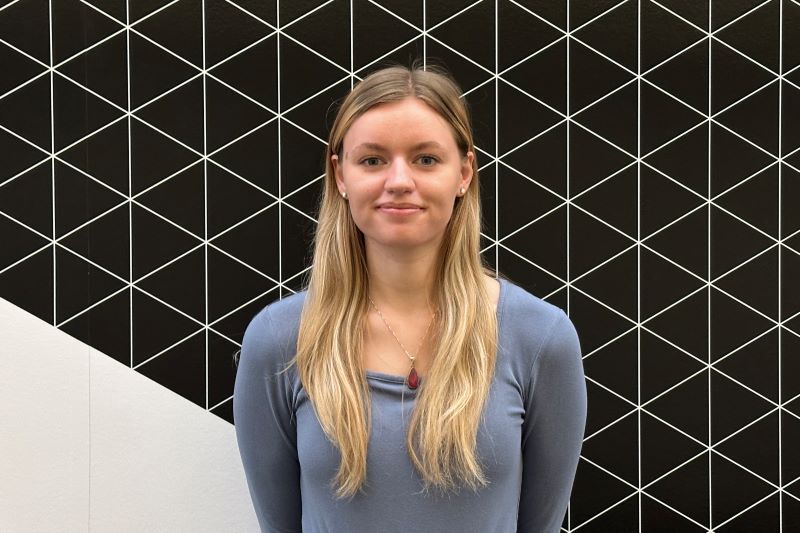
Campbell Sweet, a PhD student in chemical engineering , has received a 2024 National Science Foundation Graduate Research Fellowship (NSF GRF).
Sweet is currently in the first year of her PhD program at Mizzou, conducting research under the mentorship of Professor Patrick Pinhero . The award covers three years of a graduate program.
“I was very excited when I found out I won this award,” Sweet said. “I’m honored and grateful to have received it. I’m looking forward to putting the research I proposed in my application statement into action with the support of the National Science Foundation, my peers and my mentors.”
The path toward graduate research began for Sweet during the summer of 2021, when she started working as an undergraduate researcher in Pinhero’s lab. It was initially supposed to just be for the summer to gain experience for her resume, but Sweet was fascinated by the work and passionate about sustainable energy.
So, she continued working on projects with Pinhero after the summer ended, through the end of her senior year.
“I had a really great time doing projects as an undergrad,” Sweet said. “The more I learned in my research, the more I could use in the classroom. I could see more and more connections forming between the two in my last two years, and it made me realize that this path was right for me.”
In addition to undergraduate research, Sweet was involved with Mizzou’s chapter of the American Institute for Chemical Engineers (AIChE), the organization’s Chem-E-Car team and Mizzou Engineering Peer Learning Assistants. She was also awarded Outstanding Junior in Chemical Engineering in spring 2022 and Most Outstanding Process Design Student in spring 2023.
Sweet graduated with a Bachelor of Science in Chemical Engineering in May 2023 and returned in the fall to begin her graduate research.
“My experiences as a chemical engineering undergraduate at Mizzou prepared me to take on challenges anywhere,” she said. “I could have explored other options for graduate school, but I loved my mentors here at Mizzou and I loved Columbia. I wanted to do my best to continue learning from and contributing to this place.”
Since beginning her graduate studies, her enthusiastic approach to research has only grown.
“I love the work, I love the creativity,” she said. “I feel like you get to be more of yourself doing research — you’re not given a task that you have to complete, you get to choose the problem that you want to solve and the path you take toward the solution.”
The broader problem Sweet is trying to solve is increasing the supply of clean energy. Through her graduate research, she plans to investigate mass transfer limitations in molten salt-based electrorefining systems. Molten salt-based electrorefining is a potentially more sustainable alternative to current reprocessing techniques for spent nuclear fuel and permanent magnet scrap. She hopes that her work will contribute to optimizing the reprocessing of these materials via clean pathways and increasing their reutilization rates.
Sweet actually applied for the NSF GRF last year but did not feel as confident in her work, which was reflected in her application. But that’s changed over the past year as she’s begun her graduate studies.
“I applied last year because my research mentor encouraged me to, but I didn’t think I could get it because it was such a prestigious honor” she said. “I compared myself to others and I didn’t think that was who I was at that time. I had little confidence that I was the type of person who receives this type of award. I had to overcome that to submit a better application that was more representative of myself and my research.”
Right now, Sweet is just beginning her graduate studies. But she says that while her ultimate career goal is still undecided, she is interested in staying in academia.
“As a peer learning assistant for chemical engineering courses I became interested in teaching and instruction along with research,” she said. “So, I’m definitely thinking about post-doctoral training and potentially getting back into academia as a research professor. I’d like to make contributions to science directly as a researcher and through the education of future generations as a teacher.”
Two other Mizzou Engineering alumni taking part in PhD programs at other institutions also received NSF Graduate Research Fellowships . Congratulations to Jacob Search (mechanical engineering `22) and Yousuf El-Jayyousi (biomedical engineering `21)!
- Chemical and Biomedical Engineering
- fellowships
- graduate research fellowship
- Missouri Compacts - Research and Creative Works
- Missouri Compacts - Student Success
Explore your training options in 10 minutes Get Started
- Graduate Stories
- Partner Spotlights
- Bootcamp Prep
- Bootcamp Admissions
- University Bootcamps
- Coding Tools
- Software Engineering
- Web Development
- Data Science
- Tech Guides
- Tech Resources
- Career Advice
- Online Learning
- Internships
- Apprenticeships
- Tech Salaries
- Associate Degree
- Bachelor's Degree
- Master's Degree
- University Admissions
- Best Schools
- Certifications
- Bootcamp Financing
- Higher Ed Financing
- Scholarships
- Financial Aid
- Best Coding Bootcamps
- Best Online Bootcamps
- Best Web Design Bootcamps
- Best Data Science Bootcamps
- Best Technology Sales Bootcamps
- Best Data Analytics Bootcamps
- Best Cybersecurity Bootcamps
- Best Digital Marketing Bootcamps
- Los Angeles
- San Francisco
- Browse All Locations
- Digital Marketing
- Machine Learning
- See All Subjects
- Bootcamps 101
- Full-Stack Development
- Career Changes
- View all Career Discussions
- Mobile App Development
- Cybersecurity
- Product Management
- UX/UI Design
- What is a Coding Bootcamp?
- Are Coding Bootcamps Worth It?
- How to Choose a Coding Bootcamp
- Best Online Coding Bootcamps and Courses
- Best Free Bootcamps and Coding Training
- Coding Bootcamp vs. Community College
- Coding Bootcamp vs. Self-Learning
- Bootcamps vs. Certifications: Compared
- What Is a Coding Bootcamp Job Guarantee?
- How to Pay for Coding Bootcamp
- Ultimate Guide to Coding Bootcamp Loans
- Best Coding Bootcamp Scholarships and Grants
- Education Stipends for Coding Bootcamps
- Get Your Coding Bootcamp Sponsored by Your Employer
- GI Bill and Coding Bootcamps
- Tech Intevriews
- Our Enterprise Solution
- Connect With Us
- Publication
- Reskill America
- Partner With Us
- Resource Center
- Bachelor’s Degree
- Master’s Degree
Best Doctorates in Biomedical Engineering: Top PhD Programs, Career Paths, and Salaries
Technology is making big advancements in improving our health and quality of life, and experienced biomedical engineers play an important role in this endeavor. With a PhD in Biomedical Engineering, you can contribute significantly to these advancements while earning an excellent salary.
Schools with the best PhDs in Biomedical Engineering prepare their graduates for high-paying career opportunities in technology , engineering, and research. This article takes a deep dive into the top PhD programs in this field and the schools that offer them and provides a look at the best biomedical engineering jobs and what to expect from a PhD in Biomedical Engineering salary.
Find your bootcamp match
What is a phd in biomedical engineering.
A PhD in Biomedical Engineering is a terminal degree offered by institutions of higher education to students who complete the program requirements. The degree program takes about four to five years to complete and teaches students how to develop and produce devices that are useful in the healthcare industry. Like all doctorates, advanced coursework is required along with a substantial amount of research.
With this degree, you will be eligible for jobs in the public and private sectors and at high-level research and academic institutions. A biomedical engineering doctorate provides you with advanced skills and knowledge that make you very employable. It also opens the door to a successful career in academia.
How to Get Into a Biomedical Engineering PhD Program: Admission Requirements
The admission requirements to get into a biomedical engineering PhD program typically include having a bachelor’s or master’s degree, meeting a minimum GPA requirement, and having knowledge of advanced mathematics and an understanding of biomedical sciences.
You will have an easier time gaining admittance into a biomedical engineering PhD program if you have a solid background in science, mathematics, and engineering. Some other common requirements for admission include letters of recommendation, standardized test scores, and a resume or CV.
PhD in Biomedical Engineering Admission Requirements
- Bachelor’s degree
- Minimum GPA
- Knowledge of science and engineering subjects
- Standardized test scores
- Letters of recommendation
Biomedical Engineering PhD Acceptance Rates: How Hard Is It to Get Into a PhD Program in Biomedical Engineering?
It is not very hard to get into a PhD program in biomedical engineering as long as you meet all of the admission requirements. That said, these requirements are numerous and meeting them requires years of study in relevant subjects.
However, if you have a high GPA in your undergraduate degree and have a strong engineering background, getting into a postgraduate biomedical engineering program shouldn’t be a problem. Some schools have stricter admission guidelines than others, so make sure that you are able to meet the specific program requirements before applying.
How to Get Into the Best Universities
[query_class_embed] how-to-get-into-*school
Best PhDs in Biomedical Engineering: In Brief
Best universities for biomedical engineering phds: where to get a phd in biomedical engineering.
The best universities for biomedical engineering PhDs include Arizona State University, Carnegie Mellon University, Johns Hopkins University, and the University of North Dakota. All of the schools that made our list are accredited and offer strong biomedical engineering programs. We’ve provided key details about each school and program for comparative purposes.
Arizona State University was founded in 1885. It is a public research university and one of the largest universities in the United States. The school is home to over 1,000 national student scholars and offers 87 elite programs. The school has been ranked the most innovative school in the country for the past seven years by US News & World Report.
PhD in Biomedical Engineering
The PhD in Biomedical Engineering offered by the Ira A. Fulton Schools of Engineering at Arizona State University provides students with opportunities for specialized research-based learning in the field of biomedical engineering.
The degree program requires the completion of 84 credits, including coursework, written and oral comprehensive exams, a dissertation, and a prospectus. Students will have career opportunities as bioinformatics scientists, biomedical engineers, medical scientists, and professors after completing this degree.
PhD in Biomedical Engineering Overview
- Program Length: 4-5 years (maximum 10 years)
- Acceptance Rate: N/A
- Tuition: $11,720/year (in state); $23,544/year (out of state)
- PhD Funding Opportunities: Teaching assistantships, research assistantships, scholarships
- Bachelor’s or master’s degree from an accredited institution
- Minimum 3.0 GPA
- Application
- Official transcripts
- Current resume
- Statement of purpose
- Proof of English proficiency (non-native English speakers)
Carnegie Mellon University is a private research institution that was established in 1900. It has over 14,500 students from all over the world enrolled in different programs. The university also has a large network of over 109,900 alumni.
In this PhD in Biomedical Engineering, students develop technical knowledge and expertise by attending a research-based degree program. It focuses on core courses and concepts of biological science and medicine and allows students to conduct research in any area of interest in the relevant field of study.
Doctoral students must complete a minimum of 192 units to meet the degree requirements. Out of these 192 units, 42 must be completed in coursework. Other basic requirements include research, seminars, and a dissertation.
- Program Length: 4 years
- Acceptance Rate: 17% (overall university acceptance rate)
- Tuition: $644/unit
- PhD Funding Opportunities: Teaching assistantship
- Bachelor’s degree in any engineering or engineering-related discipline
- Transcripts (official or unofficial)
- 3 letters of recommendation
- $75 application fee
- TOEFL/IELTS scores (non-native English speakers)
Duke University is a private university in North Carolina founded in 1924. The university is known for its high quality of education, competitive programs, and global presence. There are 16,780 students enrolled in Duke’s undergraduate, graduate, and professional degree programs. More than half of the undergraduates at the university receive some kind of financial assistance.
This interdisciplinary research PhD program includes workshops and seminars to provide students with an opportunity to expand their network and develop professional skills. The degree requires the completion of 30 credits in coursework. Other degree requirements include two seminars, a two-semester teacher apprenticeship, and a thesis.
- Program Length: 5-6 years
- Tuition: $64,380/year (years 1-3); $12,480/year (years 4+)
- PhD Funding Opportunities: The graduate school covers tuition and fees for PhD students’ first five years; teaching assistantships
- Minimum 3.2 undergraduate GPA
- Application
- Minimum 90 TOEFL score (non-native English speakers)
Johns Hopkins University is a private nonprofit institution established in 1886. It is known for providing students with intellectual freedom through its innovative programs of study offered by nine schools at the university. The university is known for its efforts in scientific and medical research.
This PhD program allows students to develop their knowledge and skills in the area of medicine and technology and help them explore the practical implications of this knowledge in their careers. The program requires students to complete 30 credits of coursework in addition to other basic requirements.
These requirements include a dissertation, an oral comprehensive exam, a thesis proposal, residency, research defense, and public defense. The residency requirement is met by completing two consecutive semesters of full-time study. Students also need to attend seminars to meet the degree requirements.
- Program Length: 4-5 years (maximum 9 years)
- Acceptance Rate: 17%
- Tuition: $60,480/year
- PhD Funding Opportunities: Scholarships, fellowships, teaching assistantships, research assistantships
- Personal statement
- TOEFL scores (international students)
Rowan University was founded in 1923 and gradually grew into a public research university. It offers online, on-campus, and hybrid degree and certificate programs to students all around the world. It offers financial aid to all its deserving students, and 86 percent of the new students receive some sort of financial assistance.
The PhD in Biomedical Engineering offered by Rowan University’s Henry M. Rowan College of Engineering focuses on biomedical research. Courses cover various fundamental topics such as biomechanics, biomaterials engineering, biomolecule detection, and tissue engineering.
This graduate program requires 72 credit hours, with 30 credits in coursework and 42 credits in research. The university offers flexible coursework in biology that students can customize themselves.
- Program Length: 4-5 years
- Tuition and Fees: $933.15/credit
- PhD Funding Opportunities: Grants, loans, work-study, scholarships
- Bachelor’s degree from an accredited institution
- Essay
- 3 foundation courses
- Application and $65 application fee
Syracuse University is a private research university founded in 1870. The university is known for its students’ success upon graduating, with 92 percent of its graduates employed or enrolled in study or service programs within six months of obtaining their degree from Syracuse. Syracuse offers on-campus and online degree programs and has a large alumni network.
PhD in Bioengineering
The PhD in Bioengineering from Syracuse University’s College of Engineering and Computer Science requires a minimum of 42 credit hours. It also requires a dissertation with original research. You must defend your research work in an oral examination to qualify for the PhD.

"Career Karma entered my life when I needed it most and quickly helped me match with a bootcamp. Two months after graduating, I found my dream job that aligned with my values and goals in life!"
Venus, Software Engineer at Rockbot
The program focuses on the fundamentals of biomedical engineering and research techniques. It involves specialized study and high-level training to help students grow and develop professionally.
PhD in Bioengineering Overview
- Program Length: 5 years
- Acceptance Rate: 14%
- Tuition and Fees: $33,358/year
- PhD Funding Opportunities: University fellowships, graduate assistantships, scholarships, grants, summer funding competition
PhD in Bioengineering Admission Requirements
- Application and fee
The University of Illinois Urbana-Champaign was founded in 1867 and has earned a reputation as being one of the leading research institutions in the US. It is a public university that provides students with world-class research resources, undergraduate degrees, and graduate degrees.
The PhD in Bioengineering offered by the University of Illinois Urbana-Champaign is an innovative research program that prepares students for careers in academia, the corporate world, or the government. Students get an opportunity to learn under the supervision of highly qualified faculty and obtain specialized knowledge in this field.
Students entering the program with a bachelor’s degree must complete 96 credit hours, while those with a master’s degree must complete 64 credit hours. Credit hours are completed through coursework and research work. Other requirements include passing all exams and completing and defending a dissertation.
- Program Length: Maximum 6-7 years
- Acceptance Rate: 37% (all engineering students)
- Tuition: $19,320/year (in state); $36,798/year (out of state)
- PhD Funding Opportunities: Full and partial tuition waiver, stipend, assistantships
- Transcripts
- 3 letters of reference
- GRE scores (currently waived)
The University of North Dakota was established in 1883 and is now the state’s largest university. It is accredited by the Higher Learning Commission and offers over 225 academic learning programs in the form of undergraduate, graduate, and postgraduate degrees. The student enrollment at the university is 13,772.
The PhD in Biomedical Engineering is offered jointly through three departments at the University of North Dakota. Students can personalize their studies through the selection of a biomedical research group. These research groups include bio-instrumentation, biomaterials, biomechanics, biosignals, and others.
The program requires 90 credits obtained through a combination of coursework, research, and a dissertation. It is offered in both online and on-campus learning formats. The university also offers free workshops to enhance students’ professional skills and prepare them for their careers.
- Program Length: 3+ years
- Tuition: $545.16/credit (in state); $692.34/credit (Minnesota residents); $817.73/credit (all other out-of-state US residents); $1,090.30/credit (international students)
- PhD Funding Opportunities: Graduate assistantship, dissertation completion fellowship, doctoral research grant, doctoral conference travel grant, traineeships, awards
- Online application and $35 application fee
- Statement of goals
- 3 recommendation letters
The University of Texas at San Antonio is a public research university that was founded in 1969. It is accredited by the Southern Association of Colleges and Schools Commission on Colleges. It offers online, on-campus, and hybrid degree programs including undergraduate, graduate, and postgraduate degrees.
The biomedical engineering doctorate is jointly offered by The University of Texas Health Center at San Antonio and The University of Texas at San Antonio. It aims to provide students with the essential knowledge of this highly technical field and prepare them for the industry.
The program requires you to complete 82 credits through coursework and a dissertation. The dissertation makes up 15 credits, and the remaining are to be fulfilled by coursework. This program allows students to explore key biomedical technologies and approaches.
- Program Length: Maximum 8 years
- Tuition and Fees: $9,362/year (full time in state); $27,310/year (full time out of state)
- PhD Funding Opportunities: Grants, scholarships, loans, work-study, fellowships, stipends
- Graduate school application
- Bachelor’s or master’s degree
The University of Wisconsin-Madison is a public institution founded in 1848. It is a research institution accredited by the Higher Learning Commission. UW-Madison offers undergraduate, graduate, and doctoral programs focusing on the professional and personal development of students.
The PhD in Biomedical Engineering requires the completion of 60 credit hours, with at least 30 obtained through research. The writing center and engineering career services offered by this program make it one of the best.
The learning outcomes of this program focus on developing the research skills of students as well as their ability to communicate their knowledge to others. The dissertation requirement and dissertation defense play a significant role in this regard.
- Program Length: 4-6 years
- Acceptance Rate: 60.3% (overall university acceptance rate)
- Tuition and Fees: $12,176/year (in state); $19,292/year (Minnesota residents); $25,504/year (all other out-of-state students)
- PhD Funding Opportunities: Assistantships, fellowships, traineeships
- Bachelor’s Degree in Science or Engineering
Can You Get a PhD in Biomedical Engineering Online?
Yes, you can get a PhD in Biomedical Engineering online, but you may have to complete some of the requirements on campus. The online format makes it possible for students to complete coursework and conduct research from just about anywhere, while still having the support of faculty. Below are some of the schools that offer this degree program or a related mostly online.
Best Online PhD Programs in Biomedical Engineering
How long does it take to get a phd in biomedical engineering.
It takes about three to five years to get a PhD in Biomedical Engineering. This duration can vary due to the program itself as well as the speed at which you complete your work. The format may limit the number of credit hours you can take per semester and your research may be more or less in-depth than others.
Four years of full-time study is usually enough to complete your doctorate. Carefully research your graduate school and program of choice so that you will know if they can match your preferred timeline for completing the degree.
Is a PhD in Biomedical Engineering Hard?
A PhD in Biomedical Engineering will be easy for students who have excelled so far in their postsecondary education in biomedical engineering and related fields. If you’re pursuing a degree at the PhD level, you probably already have a passion for the particular field of study, which will make completing the program easier.
However, if you have struggled with your education so far in biomedical engineering, a PhD in Biomedical Engineering will be hard. Doctoral degrees also require a lot of advanced research skills as well as the ability to make sense of your research findings and communicate them to colleagues. Overall, the more education you have in science and engineering going in, the easier the PhD will be.
How Much Does It Cost to Get a PhD in Biomedical Engineering?
It costs an average of $19,314 per year to get a PhD in Biomedical Engineering, according to the National Center for Education Statistics. This number represents the average annual tuition and fees charged by all universities. The average cost of tuition and fees for public universities is $12,171 per year.
Tuition and fees cost $25,929 per year, on average, at private universities, with private for-profit schools charging $14,208 per year and private nonprofit schools charging an average of $27,776 per year.
How to Pay for a PhD in Biomedical Engineering: PhD Funding Options
The PhD funding options that students can use to pay for a PhD in Biomedical Engineering include teaching assistantships, research assistantships, research fellowships, scholarships, grants, stipends, and tuition fee waivers. Every university has a different policy regarding PhD funding, with some providing full coverage of costs for part or all of the program.
Best Online Master’s Degrees
[query_class_embed] online-*subject-masters-degrees
What Is the Difference Between a Biomedical Engineering Master’s Degree and a PhD?
The difference between a biomedical engineering master’s degree and a PhD is the duration of the program and the education provided. A Master’s Degree in Biomedical Engineering usually takes one to two years to complete. The requirements of the PhD program take longer to complete, usually three to five years.
A PhD in Biomedical Engineering is a research-based study program, whereas a master’s degree focuses mainly on coursework. Master’s degrees often allow students to select between thesis and non-thesis options. A PhD will require you to propose a dissertation topic, do considerable dissertation research, and then write the dissertation and defend it.
Master’s vs PhD in Biomedical Engineering Job Outlook
The job outlook for a biomedical engineering master’s degree holder varies slightly from that of a PhD holder, with the latter having more opportunities. PhD holders can access the same opportunities as master’s degree holders, in addition to opportunities in high-level research and education.
Positions like design engineer, quality assurance engineer, and product development engineer require a Master’s Degree in Biomedical Engineering but are also available to PhD holders. Positions such as data scientist, research scientist, and postsecondary teacher are usually only open to those with a PhD in Biomedical Engineering.
Difference in Salary for Biomedical Engineering Master’s vs PhD
There is a significant difference in salary for biomedical engineering master’s and PhD degrees. The level of qualification is one of the most significant factors affecting your salary. According to PayScale, the average salary for someone with a Master of Science in Biomedical Engineering is $80,000 .
A PhD in Biomedical Engineering represents the highest level of education in this field, and the corresponding salary for this degree is $102,000 on average, as reported by PayScale. You may earn more or less than these average salaries, depending on factors such as your level of expertise and experience and the job position itself.
Related Biomedical Engineering Degrees
[query_class_embed] https://careerkarma.com/blog/best-biomedical-engineering-bachelors-degrees/ https://careerkarma.com/blog/best-biomedical-engineering-masters-degrees/ https://careerkarma.com/blog/best-biomedical-engineering-associate-degrees/
Why You Should Get a PhD in Biomedical Engineering
You should get a PhD in Biomedical Engineering because it opens the door to job opportunities that pay well and are in high demand. In fact, the highest-paying jobs in the field of biomedical engineering that require a doctorate are largely projected to grow at a faster rate than other jobs in the US over the next several years, as we’ll discuss in detail in the next section.
Reasons for Getting a PhD in Biomedical Engineering
- Better job opportunities. If you want to advance in your career and explore better career options, a PhD in Biomedical Engineering will help. Having a postgraduate degree gives you an advantage in landing the best jobs at biotech companies , for example.
- Higher salaries. The average salary for a PhD holder is higher than it is for those with an undergraduate degree or even a master’s degree. You can expect to make a six-figure salary, or close to it, with a PhD.
- Increased research opportunities. A PhD in Biomedical Engineering is a research-based program that provides you with opportunities to build and strengthen your research skills and explore new knowledge. You will likely get the opportunity to work with top researchers in the field while pursuing your degree.
- Advanced knowledge in a growing field. Continuing your education in biomedical engineering by getting a PhD provides you with access to the latest science, technology, and developments in the field. You will learn about emerging technologies and their applications to make a difference in the healthcare industry.
Getting a PhD in Biomedical Engineering: Biomedical Engineering PhD Coursework

Coursework is a crucial component of earning a PhD in Biomedical Engineering. Students will be required to complete core science and engineering courses, such as introduction to biochemistry, biomedical imaging, and biomaterials engineering, as well as elective courses like mechanobiology and engineering optimization. Following is a short description of these courses.
Introduction to Biochemistry
This course involves the combined study of biology and chemistry. You will study the impact that biochemicals have on living beings and how this can help you improve healthcare for people. Chemical reactions and the action of enzymes are also the subject matter of this course.
Biomedical Imaging
In this course, you will study the medical technologies used in the diagnosis and analysis of abnormalities in the human body. The most popular medical-imaging technologies covered in this course include computerized tomography (CT) scan, ultrasound, positron emission tomography (PET) scan, and others.
Biomaterials Engineering
This course involves the study of biomaterials such as metals and polymers and how the fundamentals of engineering can be applied to these materials to solve health and quality-of-life issues for humans. The concepts taught in this course have real-world applications in the design and testing of health products and systems.
Introduction to Mechanobiology
This course deals with the study of the relationship between mechanical forces and living systems, or how living systems respond to different mechanical forces. This relationship plays a significant role in research regarding the development of life-saving medicines.
Engineering Optimization
This course teaches engineering optimization techniques, methods, and models used in the design of products and technologies that have specific restraints or criteria. It helps students develop the essential skills required for complex problem-solving to arrive at the best result.
Best Master’s Degrees
[query_class_embed] *subject-masters-degrees
How to Get a PhD in Biomedical Engineering: Doctoral Program Requirements
To get a PhD in Biomedical Engineering, you have to meet all of the degree requirements set by the school in the time allotted. Some of these requirements include completing advanced coursework, maintaining a minimum GPA in your coursework, achieving residency, conducting original research for a thesis, and writing and defending the thesis.
The coursework for a PhD is usually completed in the first year or two of the degree program. Courses will be required in core subject areas as well as in electives of your choosing. A comprehensive exam will be administered once your coursework is complete to test your knowledge of the field in general before you go on to conduct your research.
Every PhD in Biomedical Engineering program has a minimum GPA requirement for students to maintain throughout their studies. This minimum usually ranges between 3.0 and 3.5 on a 4.0 scale. Even if you meet all of the other requirements for your PhD, failing to meet the required GPA would likely result in the withholding of your degree.
The majority of PhD programs have a residency requirement for their students to meet. This typically can be done by completing two consecutive semesters, or one academic year, as a full-time student on campus. Students should meet with their advisor to discuss this requirement, as it can vary from school to school and sometimes be flexible.
The final requirement for a PhD in Biomedical Engineering is the writing and defense of a thesis. For this, you will select an area of interest in the field to study. Once your topic is approved, you will conduct original research and summarize your findings in a written thesis. You will also have to complete a thesis defense before being awarded your PhD.
Potential Careers With a Biomedical Engineering Degree
[query_class_embed] how-to-become-a-*profession
PhD in Biomedical Engineering Salary and Job Outlook
A PhD in Biomedical Engineering can help you achieve a successful career. It is not unusual for PhD holders in this field to make more than $100,000 per year in positions that have positive job outlooks. There is strong growth projected in the coming years for many of the highest-paying positions in biomedical engineering.
What Can You Do With a PhD in Biomedical Engineering?
With a PhD in Biomedical Engineering, you can pursue a career in the world of academia as a professor or researcher. You might even achieve status as a leader in the industry with the discovery of a medical breakthrough. Other jobs you might consider include medical scientist, consultant, or technician.
Best Jobs with a PhD in Biomedical Engineering
- Postsecondary Teacher
- Research Consultant
- Biomedical Engineer
- Medical Scientist
- Biomedical Researcher
What Is the Average Salary for a PhD in Biomedical Engineering?
The average salary for someone with a PhD in Biomedical Engineering is $102,000, as determined by PayScale. Your actual salary will depend on a number of factors, including your level of experience and the organization you are working for. Some popular companies hiring biomedical engineers are Philips Research, Johnson & Johnson, United Therapeutics Corporation, and Boston Scientific Corporation.
Highest-Paying Biomedical Engineering Jobs for PhD Grads
Best biomedical engineering jobs with a doctorate.
You can get some of the best biomedical engineering jobs with a doctorate. Many of these jobs require at least a bachelor’s degree at entry-level, and having a doctorate increases your odds of beating the competition. It also strengthens your earning potential. Following are some of the highest-paying jobs for a PhD holder in biomedical engineering.
Biomedical engineers are also known as bioengineers. Their key role is to combine the fundamentals of engineering with healthcare science to seek innovation in equipment, methods, and procedures. They are involved in designing and manufacturing modern treatment machines, artificial human organs, and devices to cater to the medical needs of patients.
- Salary with a Biomedical Engineering PhD: $97,410
- Job Outlook: 6% job growth from 2020 to 2030
- Number of Jobs: 19,300
- Highest-Paying States: New Mexico, Arizona, Minnesota, Connecticut, Massachusetts
As their title indicates, medical scientists mainly research and study human health and related issues. They conduct experiments through clinical trials to test their hypotheses and reach a conclusion. The primary objective of their research, experimenting, and findings is to improve the quality of healthcare services.
- Salary with a Biomedical Engineering PhD: $95,310
- Job Outlook: 17% job growth from 2020 to 2030
- Number of Jobs: 133,900
- Highest-Paying States: Connecticut, Maine, Delaware, New Jersey, Tennessee
Mechanical engineers research, design, and test thermal and mechanical sensors and devices, including everything from robots to internal-combustion engines. They use their engineering skills and experience to solve problems using computer software, and then oversee the production of new devices.
- Salary with a Biomedical Engineering PhD: $95,300
- Job Outlook: 7% job growth from 2020 to 2030
- Number of Jobs: 299,200
- Highest-Paying States: New Mexico, Louisiana, District of Columbia, California, Alaska
With a PhD in Biomedical Engineering, you can become a postsecondary teacher with job opportunities at the top universities and research centers. Besides providing instruction to students, postsecondary teachers may also conduct research and publish their findings in academic journals.
- Salary with a Biomedical Engineering PhD: $79,640
- Job Outlook: 12% job growth from 2020 to 2030
- Number of Jobs: 1,276,900
- Highest-Paying States: Arkansas, California, New Hampshire, Utah, New York
Forensic science technicians collect samples for forensic research in criminal cases and also for general laboratory research. They determine what type of samples they need and collect them carefully. They then study the samples using chemical processes and other analysis techniques to derive conclusions.
- Salary with a Biomedical Engineering PhD: $61,930
- Job Outlook: 16% job growth from 2020 to 2030
- Number of Jobs: 17,200
- Highest-Paying States: Illinois, California, Massachusetts, New York, Oregon
Is a PhD in Biomedical Engineering Worth It?
Yes, a PhD in Biomedical Engineering is worth it. The doctoral degree allows you to specialize in biomedical engineering and become an expert in the field through advanced coursework and in-depth research into a particular area of interest.
From a career perspective, it allows you to pursue the highest-paying and most in-demand engineering careers . Some of the most prestigious companies and institutions, such as NASA, hire biomedical engineers. You can also conduct your own industry-leading research with the opportunity to make breakthroughs in the field.
Additional Reading About Biomedical Engineering
[query_class_embed] https://careerkarma.com/blog/jobs-for-biomedical-engineering-majors/ https://careerkarma.com/blog/best-schools-for-biomedical-engineering/ https://careerkarma.com/blog/online-biomedical-engineering-masters/
PhD in Biomedical Engineering FAQ
To gain admission into a good PhD in Biomedical Engineering program, you must be able to meet the admission requirements, such as having a bachelor’s degree from an accredited university. Having a high GPA in your college coursework is helpful, as are having a background in the field and scoring high on standardized tests like the GRE. Review the application process closely before getting started.
Yes, accredited PhD programs are more valued than non-accredited ones. Accreditation validates the quality of education the program provides. This helps pave the way for better career and education opportunities in the future.
Yes, earning a PhD in Biomedical Engineering is a good continuing education option. It deepens your knowledge of the field and helps you build advanced scientific research skills. You might even have the opportunity to make a contribution to the field of biomedical engineering through your research.
No, you can’t get a PhD in Biomedical Engineering without completing your thesis. This is one of the most crucial degree requirements for a doctorate. In addition to writing your thesis, you must also defend it successfully in order to be awarded the degree.
About us: Career Karma is a platform designed to help job seekers find, research, and connect with job training programs to advance their careers. Learn about the CK publication .
What's Next?
Get matched with top bootcamps
Ask a question to our community, take our careers quiz.

Leave a Reply Cancel reply
Your email address will not be published. Required fields are marked *

Computer Science and Engineering
Search form.
- Future Students
- Current Students
- Accreditation
- Financial Assistance
- GradTrack Program
- Capstone Program
- Marketable Skills
- Study Abroad
- Internships
- UNT at Frisco
- Grad Orientation
- Financial Assistantship
- Pathways Program
- CSE Seminars
- Graduate Course Scheduling
- Retired Faculty
- TAs/Graders
- Peer Mentor /UG Grader
- Stay Connected
- PhD Graduates
- Update Your Info
- Order Transcript
- About the Department
- Our History
- Advisory Council
- Faculty History
- Student Organizations
- Give to CSE
- Centralized Environment for Linux Labs (CELL Machines)
- Faculty Resources
PhD candidates and faculty selected as winning team for the 2024 Siemens Tech Sustainabilitiy through Cybersecurity Challenge

On March 14, 2024, research from our Network Security Lab received the winning team award for the 2024 Siemen’s Tech Sustainability through Cybersecurity Challenge . PhD candidates, Amal Alshehri and Burak Tufekci, as well as Assistant Professor, Dr. Cihan Tunc , were one of the finalist research groups (out of 22 projects) and their project “OTZET: Operational Technology Zero Trust Engine for Trustworthiness” has been selected as the winning project during Siemens’ international competition.
The group’s project underwent 4 stages of review consisting of a 4-month timeframe. The first stage, Ideation, occurred during the month of December 2023, saw a large pool of research ideas submitted by universities and companies around the world. Then, the selected projects ideas were implemented under Siemens’ guidance. And the final review was made in March 2024 for the selected finalists, which allowed our team to present and win the competition under the sustainability through cybersecurity track during the final Hackathon & Live Pitches stage last month. The audience consisted of respected professionals in cybersecurity, as well as those in academia, with potential of future collaboration or sponsorship.
Here’s what Siemens outlines as their goals for their Cybersecurity challenge in Sustainability: At Siemens, we consider cybersecurity as one of the company’s sustainability goals. We live in an ever-evolving environment filled with digital threats and risks. Only through robust cybersecurity can we effectively address those risks. This includes safeguarding information and intellectual property by preventing digital attacks from materializing in the real world, or by supporting businesses and production sites to operate without disruptions.
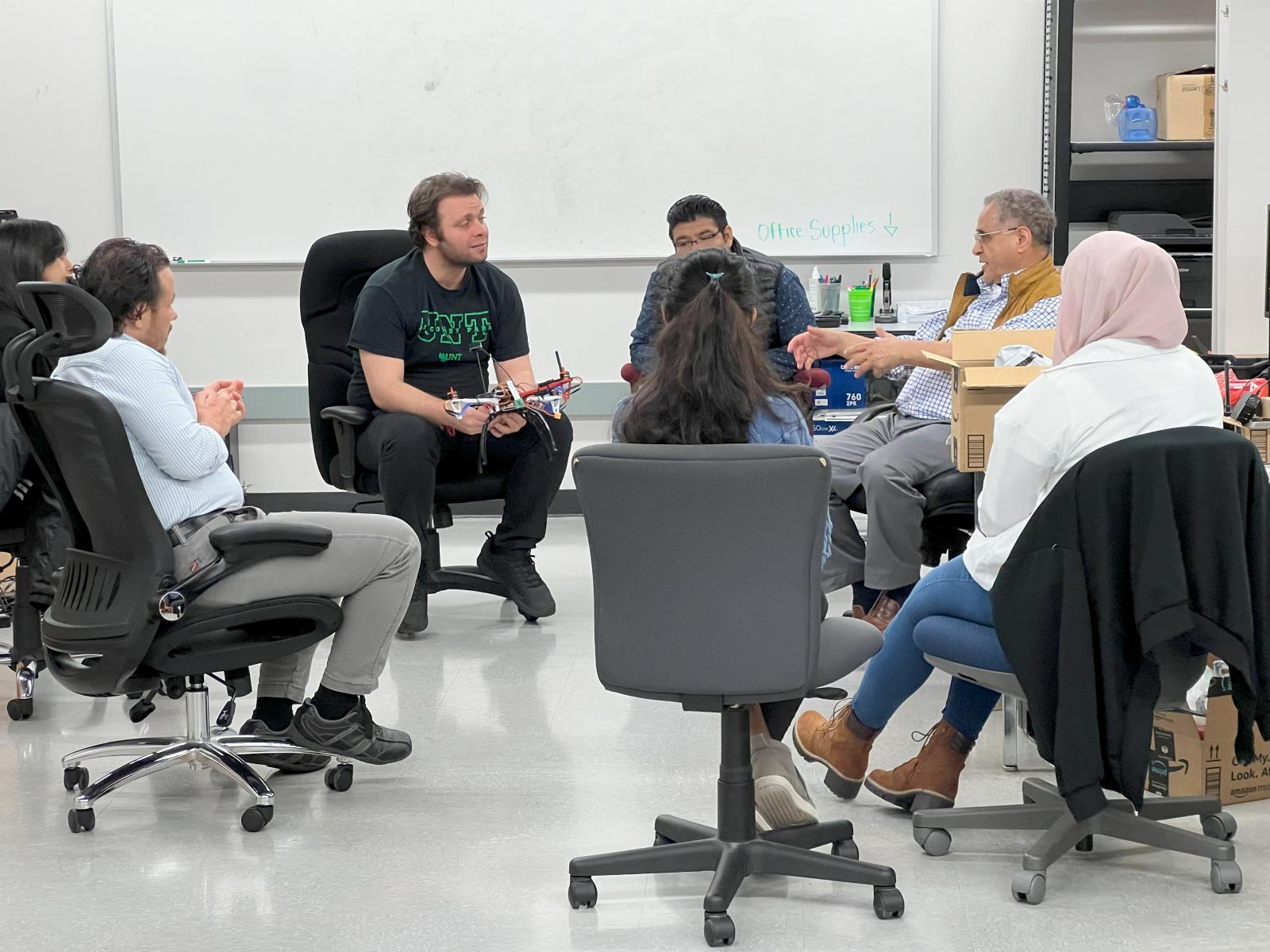
The OTZET project continues on as the Network Security Lab crew are moving forward with more paper submissions and more advances in their work. Dr. Cihan Tunc states, “We’re looking to build this research for further progression. [Amal Alshehri] is doing this for her final research.”
The Department of Computer Science and Engineering extends a huge congratulations to Amal Alshehri, Burak Tufekci, and Dr. Cihan Tunc on a job well done!
For more information on the Network Security Lab and the Smart CyberSpace group, check out their website links here:
Home | Network Security Lab (NSL) (unt.edu )
Welcome to Smart CyberSpace (SCS) at UNT | Smart Cyber Space (SCS)
For more information on Siemens, click here to access their website: Sustainability through cybersecurity | Siemens Innovation Ecosystem
- Campus Life
- Carsey School of Public Policy
- College of Engineering & Physical Sciences
- College of Health & Human Services
- College of Liberal Arts
- College of Life Sciences & Agriculture
- Cooperative Extension
- Graduate School
- Peter T. Paul College of Business & Economics
- School of Marine Science and Ocean Engineering
- Thompson School of Applied Science
- UNH Manchester
- UNH Franklin Pierce School of Law
- Faculty/Staff
Like us on Facebook
Follow us on Twitter
Follow us on YouTube
Follow us on Instagram
Find us on LinkIn
UNH Today RSS feeds
UNH Today is produced for the UNH community and for friends of UNH. The stories are written by the staff of UNH Marketing. Email us: [email protected] .
Manage Your Subscription Contact Us
UNH Today • UNH Main Directory: 603-862-1234 Copyright © 2024 • TTY Users: 7-1-1 or 800-735-2964 (Relay NH) USNH Privacy Policies • USNH Terms of Use • ADA Acknowledgement

Three UNH graduate students and two alumni received prestigious Graduate Research Fellowships (GRFP) from the National Science Foundation. Awarded to students pursuing master’s and doctoral degrees in science, technology, engineering and mathematics, the five-year fellowship includes three years of financial support, with an annual stipend and tuition allowance. Current student recipients are master’s students Alexis Eaton and Callyan Lacio and Ph.D. student Else Schlerman. Alumni recipients are Eli Duggan ’23, currently studying at the University of Strathclyde in Glasgow, Scotland; and UNH Manchester graduate Nicole Gallien ’22.

Alexis Eaton ’24 will be receiving her bachelor’s degree in environmental engineering and sustainability, and she will utilize her NSF GRFP to pursue a master’s degree at UNH in civil and environmental engineering next year. She plans to then continue her education in a Ph.D. program in environmental biochemistry or a similar field.
Eaton’s proposal centered around the presence of PFAS (per- and polyfluoroalkyl substances) in septic systems.
“PFAS are a group of manmade emerging contaminants that have been widely used in commercial products because of their resistance to heat, water and oil,” says Eaton. “These substances have been linked to various forms of cancer, reproductivity toxicity and poor thyroid function.”
Eaton’s research, mentored by professor of civil and environmental engineering Paula Mouser, has focused on the fate and transport of emerging contaminants. She says it is important to know where these chemicals end up in the environment, along with what types of substances they produce.
“Emerging contaminants are harmful to the environment and human health; we need to be able to determine what influences our exposure to these compounds and predict potential exposure pathways,” Eaton says.

Callyan Lacio , currently a first-year master’s student in the integrative biology program , is conducting acoustic research that monitors and studies animals' calls to estimate their population sizes and look at changes in breeding timing and behaviors. She also prioritizes integrating Indigenous knowledge and culture into her work.
Her advisor is assistant professor Laura Kloepper, who leads the Ecological Acoustics and Behavior Lab. She is also involved with the Center for Acoustics Research and Education at UNH’s Institute for the Study of Earth, Oceans and Space.
Lacio, who earned her bachelor’s degree in zoo science and conservation science at Friends University in Wichita, Kansas, uses passive acoustic monitoring, a technique Lacio says has lower impacts on the animals than normal monitoring efforts. She is also helping the Mashpee Wampanoag Nation create culture-to-career connection materials relating to STEM and her seal research in Cape Cod.
“The ‘culture-to-career’ connection focuses on taking what the Nation students are comfortable with, like their cultural stories and practices, and showing them how the knowledge and appreciation of their culture can be made into a career, for example culinary arts focusing on Indigenous foods or biology focusing on protecting Indigenous lands,” she says.
The GRFP will support Lacio’s move to UNH’s integrative biology Ph.D. program. Her goal is to work for a non-profit or foundation focused on helping animal populations that are locally at risk. As a Cherokee citizen, she also hopes to continue working with local Indigenous Nations and create culture-to-career connections for their students.

Else Schlerman wants to find ways that humans can live more harmoniously with the natural world, especially in face of climate change and large-scale habitat loss. As a doctoral student in the Natural Resources and Earth Systems Science Ph.D. program, her research focuses on soil’s potential to store carbon, which speaks to her broad interest in ecologically informed climate change solutions. She is working with professor Stuart Grandy and associate professor Jessica Ernakovich in UNH’s Center of Soil Biogeochemistry and Microbial Ecology .
“Soils are the largest terrestrial pool of carbon – greater than the vegetation and atmosphere stocks combined,” says Schlerman, who earned her bachelor’s degree in physics with a German minor from Wellesley College. “Ecosystem-based land management practices can improve the health of the soil and the environment while also removing carbon from the atmosphere. Through my research, I hope to develop the basic research on the mechanisms of soil carbon storage that can inform agricultural and ecological management strategies.”
After completing her doctorate, Schlerman plans to work as a scientist for an environmental conservation organization where she can apply the research she’s doing now to broader restoration and conservation efforts.
NSF awarded 500 fewer GRFP awards this year, making competition for the fellowship especially stiff, says Leigh Pratt, director of UNH’s Office of National Fellowships . Pratt and Michael Thompson, director of Research & Large Center Development , prepare UNH candidates for success as co-teachers of the UNH NSF GRFP class each fall ( INCO 791 / GRAD 891 ). The course prepares eligible seniors and first- and second-year graduate students to submit applications to the program. Since UNH began offering the GRFP prep in 2019, 13 of 16 students who have been awarded the fellowship have taken the class.
Written By:
Compiled by:, related articles.
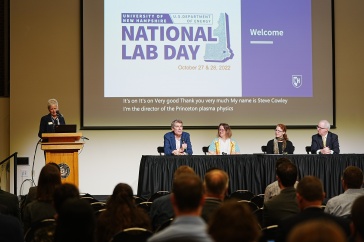
National Lab Day
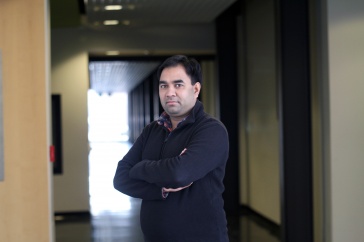
Repurposing Drug Compound Could Slow COVID Spread
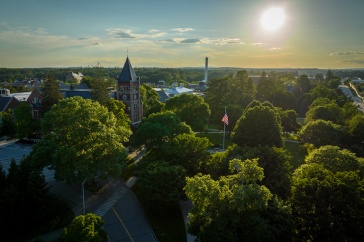
CAREER Builders
- Innovation at WSU
- Directories
- Give to WSU
- Academic Calendar
- A-Z Directory
- Calendar of Events
- Office Hours
- Policies and Procedures
- Schedule of Courses
- Shocker Store
- Student Webmail
- Technology HelpDesk
- Transfer to WSU
- University Libraries
Max Proctor, featured above with Hercules beetles, is one of three Wichita State University students who have been awarded the prestigious Graduate Research Fellowship from the National Science Foundation.
Shocker students earn coveted NSF graduate research awards
By Sara Ornelas, Strategic Communications
Three Wichita State University students have secured the prestigious Graduate Research Fellowship from the National Science Foundation — an award worth $159,000 over three years.
The students — Anthony Ciletti, a senior in mechanical engineering; Reilly Jensen, who is pursuing a master’s degree in biomedical engineering; and Max Proctor, a second-year master’s student studying biological sciences — were chosen among more than 12,000 students nationwide who applied for the fellowship.
According to the NSF, the Graduate Research Fellowship Program “recognizes and supports outstanding graduate students who are pursuing full-time research-based master's and doctoral degrees in science, technology, engineering and mathematics or in STEM education.”
Anthony Ciletti
Ciletti came to Wichita State from Lucas, Texas, about an hour outside of Dallas. Among the 13 colleges he visited and considered, he chose WSU for its connections to the aircraft industry and the opportunities available through the National Institute for Aviation Research.
“My visit here turned WSU from another university I didn’t even know existed into my top choice,” he said.
During his first year at WSU, Ciletti connected with Dr. Bhisham Sharma, former WSU assistant professor of aerospace engineering. Sharma invited Ciletti to work on the research being done at the Mechanics, Acoustics and Dynamics Laboratory (MADLab). The project focused on using 3D printing to study new designs and structures for materials that absorb sound.
“In my first year working with Dr. Sharma, I wore a lot of hats, learned a lot and assisted with other projects. I worked on 3D printing, topology creation software, acoustic measuring equipment, image processing and acoustic analysis,” Ciletti said.
Eventually, Ciletti settled into his own research focusing on developing a method to predict the acoustic performance of non-periodic porous materials using 3D representations, aiming to streamline the design process for specific applications.
“The research I’m doing is certainly quite different from the traditional focuses of aerospace in the big four — aerodynamics, structures, propulsion and stability and control. But advancing aerospace design is a multi-disciplinary effort, where every aspect of flight and operations needs significant attention and specialized solutions,” he said. “I hope the work I’m doing will be a small part of what makes the next generation of aircraft faster, safer, greener and — in my case — quieter.”
Ciletti also works with NASA on his research. He is an Experiential Aeronautics Fellow with NASA in Kansas and has been an intern at NASA Langley’s Liner Physics Team.
“Anthony's research bridges the gap between fundamental materials science and real-world applications, aiming to create quieter, more efficient and ultimately safer airplanes,” said Dr. Anthony Muscat, dean of WSU’s College of Engineering.
Ciletti will graduate from Wichita State with a bachelor’s degree in May and will then attend graduate school.
Reilly Jensen

It was his grandmother who inspired Reilly Jensen’s proposal on his Graduate Research Fellowship application. Through his research, Jensen wants to use a radio frequency resonator alongside artificial intelligence to detect and classify cerebral strokes in a rabbit model.
“My grandmother suffered from a stroke around this time last year. Though she had a wonderful recovery, I realized how critical the time from the onset of stroke to treatment is,” Jensen said. “If a more rapid method for detecting and classifying strokes can be developed, more of the 13.7 million strokes reported every year will have better outcomes.”
Jensen came to Wichita State from Buhler, Kansas, to pursue his graduate studies after earning a bachelor’s degree from Kansas State University.
“I was impressed with the facilities, faculty and resources available to the students when I first toured the campus. Additionally, I get the opportunity to be closer to family,” he said.
His stroke research will involve microwave sensing and imaging, animal models of cerebral stroke, machine and deep learning methods, and the impact of cerebral strokes on public health.
"Reilly’s research aims to develop a rapid, easy-to-use microwave sensor for stroke detection, potentially improving patient outcomes by expediting diagnosis and treatment,” Muscat said.
After he completes his master’s research, Jensen said he’ll pursue his Ph.D. and then possibly work with brain-computer interfaces.
“Ultimately, I hope to contribute to research which will reduce suffering in the world via engineering principles,” he said.
Max Proctor
When someone asked Dr. Mary Liz Jameson, professor of biological sciences, if she’d heard Max Proctor’s good news, she had to pause and ask, “Let’s see: Which of Max’s exciting news are you referring to?”
Not only has Proctor earned the NSF’s Graduate Research Fellowship, but he has also completed his thesis and earned a fellowship in Taiwan to study Hercules beetles.
Beetles are a big deal for Proctor. In fact, they’re the reason he came to WSU.
“I came to Wichita State so I could work with Dr. Mary Liz Jameson,” he said. “Dr. Jameson is a highly regarded specialist of scarab beetles, which are my favorite. Dr. Jameson has a reputation for being an amazing advisor so I knew her lab would be the perfect place.”
Proctor’s research focus is on the evolution and ecology of animal weapons, and he examines how larval diet and temperature alter the expression of horns in the dung beetle.
“Many scarab beetles have elaborate horns and weapons that make you question how could nature get so crazy!” he said.
For the NSF award, Proctor proposed “to determine why certain animal species evolved multiple different kinds of weapons.”
For that, he will travel to Taiwan to study the Dicronocephalus wallichii, or the reindeer beetle, which “uses both horns and extended forelimbs to fight.”
“The research Max proposed for his GRPF is his big dream – since the first day that I spoke with him about his aspirations,” said Jameson. “It is important to dream big.”
The NSF award will give Proctor an opportunity to focus completely on his research, said Dr. Andrew Hippisley, dean of the Fairmount College of Liberal Arts and Sciences.
The highly competitive award will provide Proctor with the support needed to pursue his passion: three years of financial aid that includes an annual stipend of $37,000.
“What this means is that Max can focus 100% on his education and make a strong start to what looks like an exciting research program. I am thrilled for him,” Hippisley said.
About Wichita State University
Wichita State University is Kansas' only urban public research university, enrolling more than 23,000 students between its main campus and WSU Tech, including students from every state in the U.S. and more than 100 countries. Wichita State and WSU Tech are recognized for being student centered and innovation driven.
Located in the largest city in the state with one of the highest concentrations in the United States of jobs involving science, technology, engineering and math (STEM), Wichita State University provides uniquely distinctive and innovative pathways of applied learning, applied research and career opportunities for all of our students.
The Innovation Campus , which is a physical extension of the Wichita State University main campus, is one of the nation’s largest and fastest-growing research/innovation parks, encompassing over 120 acres and is home to a number of global companies and organizations.
Follow Wichita State on social media:
- X | Twitter
Related Stories

Badges at WSU support the workforce through targeted training opportunities

Texas Shocker Spotlight: Alex Day

15 full-ride Rudd Scholarships awarded to WSU-bound students

New Duerksen amphitheater mural will celebrate Wichita State's Hispanic influences
- MyU : For Students, Faculty, and Staff
Onrí Jay Benally receives 2024 NSF Graduate Research Fellowship
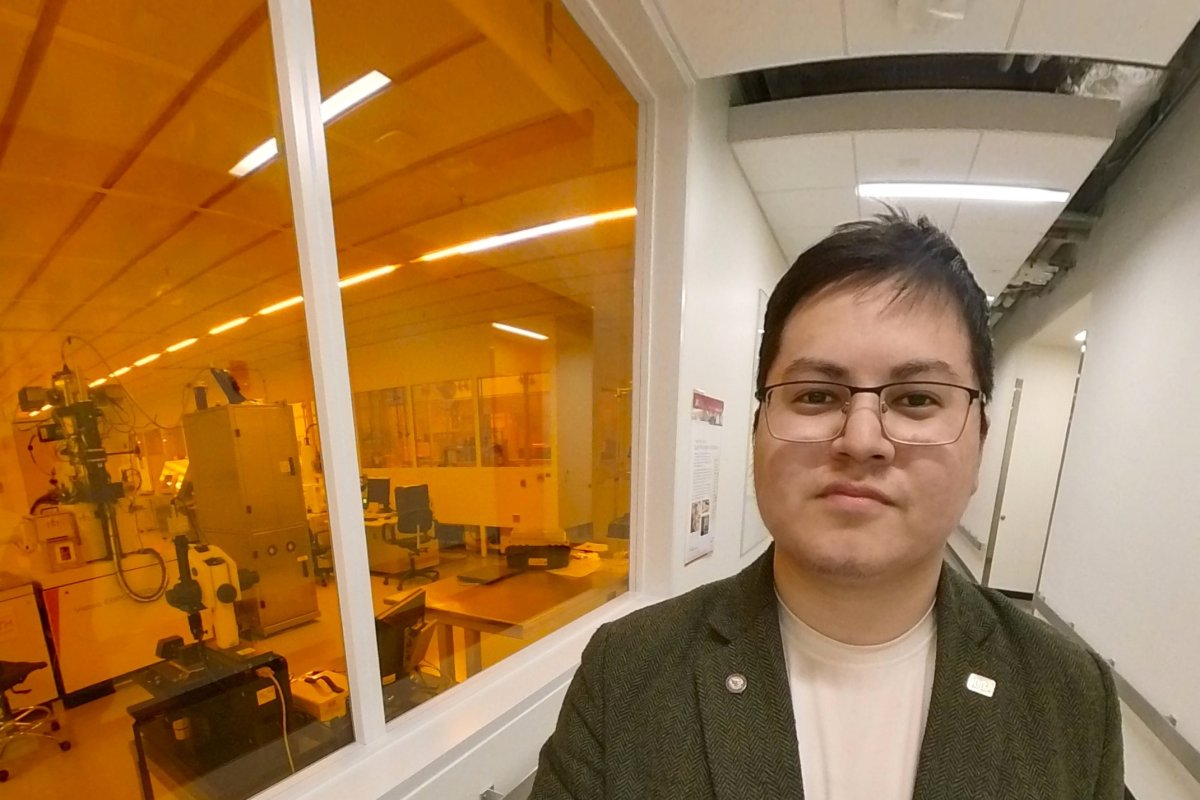
Doctoral student Onrí Jay Benally is a 2024 recipient of the prestigious National Science Foundation Graduate Research Fellowship. Benally is currently pursuing his doctoral research under the guidance of Distinguished McKnight Professor and Robert F. Hartmann chair Jian-Ping Wang exploring the world of quantum computing and spintronic devices.
A Navaho (Diné) tribesman and carpenter, Benally comes to us from the mountains of Red Valley and Oak Springs, Arizona. After graduating from tribal high school, he found himself building off-road electric vehicles at a Utah State University lab led by Professors Curtiz Frazier and Jared Barrett. Two years later, in 2017, he transferred to the University of Minnesota and accepted a Research Experiences for Undergraduates (REU) through the NSF-funded Materials Research Science and Engineering Center (MRSEC) at the University. During this time, he worked with Professor Vlad Pribiag (School of Physics and Astronomy) building nanoelectronic devices in the cleanroom for Majorana fermion research. The REU was Benally’s first brush with quantum technology exploration. He returned to the MRSEC REU in summer 2018 and this time he worked with Wang on micro and nanoscale magnetic tunnel junctions for classical computer memory and logic applications. He earned his bachelor’s degree in multidisciplinary studies from the University in 2021.
While Benally was working on his undergraduate degree, he earned an IBM certificate in quantum computation using Qiskit, and began hypothesizing how metallic-based spintronics and new architectures could be used to support the expansion of quantum supercomputing worldwide. The initial hypothesis motivated him to enter ECE’s doctoral program in fall 2022.
Reflecting on his interest in quantum technology and his skills as a carpenter, Benally says, "Carpentry was my livelihood on the tribe before completing my undergraduate degree. It is a big part of who I am and has indirectly led to my success as a nanofabricator of spintronics and quantum chips." Benally shares that one of his first toys as a kid was a toy hammer.
Benally’s research interests revolve around the engineering of quantum computing hardware and spintronic devices. An interdisciplinary area, his research involves the nanofabrication of ultrafast nanoscale magnetic tunnel junctions, cryogenic magnetic random-access memory (cryo-MRAM), and hybrid spintronic quantum processing units (QPUs), systems that can form scalable, sustainable quantum hardware architectures. Under the guidance of Wang, Benally designs and fabricates these systems at the Minnesota Nano Center at the University. Benally addressed these new developments in his keynote speech at the Arizona State University-led Quantum Collaborative Summit this past fall in San Antonio, Texas. Over the upcoming summer, Benally will be a graduate intern with IBM Research in Yorktown Heights, New York. As a quantum hardware engineer, he will be working on cutting edge cryogenic electronics for large-scale superconducting quantum computers.
Benally has accepted the NSF Graduate Research Fellowship and feels honored to start delivering on his proposed ideas on supporting quantum supercomputing through spintronics and new architectures.
The NSF Graduate Research Fellowship Program helps “ensure the quality, vitality, and diversity of the scientific and engineering workforce of the United States.” Learn about the program and eligibility requirements.
Related feature stories
- In Conversation with alumna Pushpavati Paladugu
- Wen Zhou receives doctoral dissertation fellowship and Early Innovation Fund award
- Burhaneddin Yaman recognized with best dissertation award
- Renata Saha's team wins third place at MMM 2022 Magnetic Sensor Challenge
- Alumnus Thomas Coughlin is 2023 IEEE President-Elect
- Future undergraduate students
- Future transfer students
- Future graduate students
- Future international students
- Diversity and Inclusion Opportunities
- Learn abroad
- Living Learning Communities
- Mentor programs
- Programs for women
- Student groups
- Visit, Apply & Next Steps
- Information for current students
- Departments and majors overview
- Departments
- Undergraduate majors
- Graduate programs
- Integrated Degree Programs
- Additional degree-granting programs
- Online learning
- Academic Advising overview
- Academic Advising FAQ
- Academic Advising Blog
- Appointments and drop-ins
- Academic support
- Commencement
- Four-year plans
- Honors advising
- Policies, procedures, and forms
- Career Services overview
- Resumes and cover letters
- Jobs and internships
- Interviews and job offers
- CSE Career Fair
- Major and career exploration
- Graduate school
- Collegiate Life overview
- Scholarships
- Diversity & Inclusivity Alliance
- Anderson Student Innovation Labs
- Information for alumni
- Get engaged with CSE
- Upcoming events
- CSE Alumni Society Board
- Alumni volunteer interest form
- Golden Medallion Society Reunion
- 50-Year Reunion
- Alumni honors and awards
- Outstanding Achievement
- Alumni Service
- Distinguished Leadership
- Honorary Doctorate Degrees
- Nobel Laureates
- Alumni resources
- Alumni career resources
- Alumni news outlets
- CSE branded clothing
- International alumni resources
- Inventing Tomorrow magazine
- Update your info
- CSE giving overview
- Why give to CSE?
- College priorities
- Give online now
- External relations
- Giving priorities
- Donor stories
- Impact of giving
- Ways to give to CSE
- Matching gifts
- CSE directories
- Invest in your company and the future
- Recruit our students
- Connect with researchers
- K-12 initiatives
- Diversity initiatives
- Research news
- Give to CSE
- CSE priorities
- Corporate relations
- Information for faculty and staff
- Administrative offices overview
- Office of the Dean
- Academic affairs
- Finance and Operations
- Communications
- Human resources
- Undergraduate programs and student services
- CSE Committees
- CSE policies overview
- Academic policies
- Faculty hiring and tenure policies
- Finance policies and information
- Graduate education policies
- Human resources policies
- Research policies
- Research overview
- Research centers and facilities
- Research proposal submission process
- Research safety
- Award-winning CSE faculty
- National academies
- University awards
- Honorary professorships
- Collegiate awards
- Other CSE honors and awards
- Staff awards
- Performance Management Process
- Work. With Flexibility in CSE
- K-12 outreach overview
- Summer camps
- Outreach events
- Enrichment programs
- Field trips and tours
- CSE K-12 Virtual Classroom Resources
- Educator development
- Sponsor an event
Javascript must be enabled for the correct page display.

- Find a Person
- Department Resources
Department of Materials Science and Engineering
- Department Leadership
- MatSE Faculty
- External Advisory Board Members
- Strategic Plan
- Diversity, Equity, Inclusion and Belonging
- 115th MatSE Anniversary
- By The Numbers
- Faculty Honors and Awards
- Safety is our Priority
- Accreditation
- Materials Visualization Competition (MVC)
- Taylor Lecture
- Tressler Lecture
- McFarland Award
- Visit/Contact Us
- Friends of MatSE
- Bachelor of Science (B.S.)
- Undergraduate Minors
- Laboratory Facilities
- Major Exploration
- Undergrad Admissions and Aid
- Come Visit, Get to Know Us
- Undergraduate Research
- Clubs and Organizations
- Diversity Programs
- Honors, Exhibitions, and Award Competitions
- Internships & Career Resources
- Undergraduate Lab Access
- Ombudsperson
- Helpful Penn State Resources
- Millennium Scholars Program
- EMSAGE Laureate
- Ryan Family Student Center
- How to Apply - IGDP
- Admission Requirements
- IGDP Faculty
- Research Groups
- Research Videos
- Masters of Science (M.S.)
- Accelerated M.S. in MatSE
- Additive Manufacturing and Design (M.S. and M.Eng)
- Doctoral Degree (Ph.D.)
- Computational Materials Doctoral Minor
- Program Learning Objectives
- Graduate Course Listing
- Assistantships, Awards, Scholarships, and Fellowships
- Graduate Organizations
- Graduate Poster Competition
- Accelerated M.S. Poster Session
- MRS Student Spotlight
- NSF Graduate Research Fellowships
- Polymer Physics Seminar
- Accelerated M.S. Handbook
- IGDP Handbook
- Contact Graduate Program
- Ph.D. Comprehensive Exam
- 590 Seminars
- Qualifying Exam Committee Evaluation Form
- Find a Faculty Member
- Facilities and Centers
- Research Focus Areas
- Job Opportunities
- For Industry
- Alumni Spotlight
- Get Involved
- EAB Intranet
- Tenure-line Faculty
- Research and Teaching Faculty
- Emeritus Faculty
- Associated Faculty
- Lectures in Materials
- DEIB Events and Programs
- MatSE Spring Awards
- Imagine Fall/Winter 2023
- Imagine Spring/Summer 2023
- Imagine Fall 2022
- Imagine Summer 2022
- Imagine Fall 2021
- Imagine Summer 2021
- Imagine Fall 2020
- Imagine Summer 2020
- Imagine Fall 2019
- For the Media
2024 Graduate Awards
Our 2024 Awards Presentation recognizes outstanding graduate students accomplishments from the academic year.
We thank our generous alumni, friends and partners for making these awards possible for our graduate students. Their generosity is critical in furthering the mission of our department, and we thank each of our benefactors and scholarship donors for their continued support.
For more information on 2024 MatSE Awards, click here .
Robert E. Newnham Award for Research Excellence
This award recognizes outstanding graduate students enrolled in the Intercollege Graduate Degree Program in MatSE.
Awarded to: Erik Furton, Katelyn Kirchner, Sergei Stepanoff, Hui Sun, and Haodong Wu
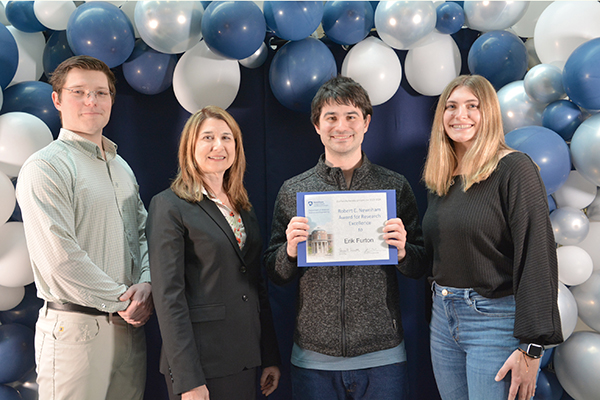
Erik Furton
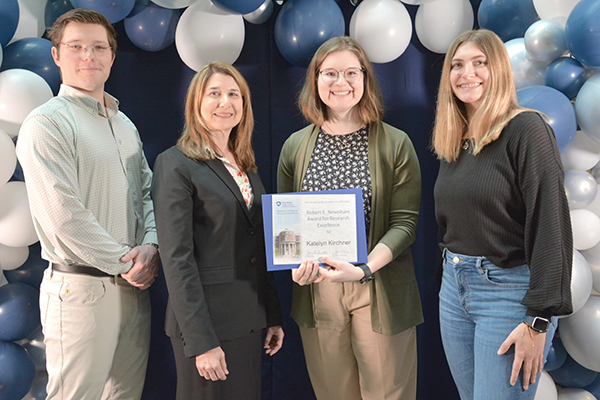
Katelyn Kirchner
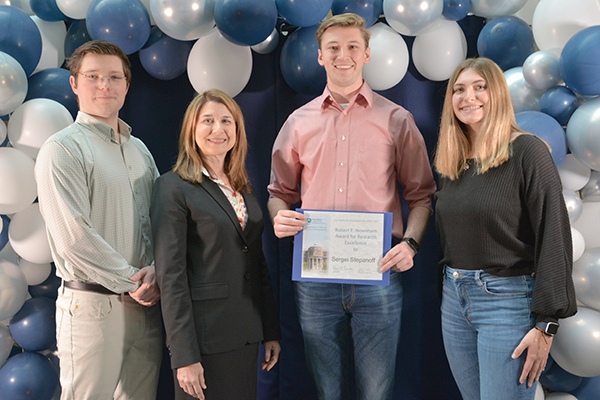
Sergei Stepanoff
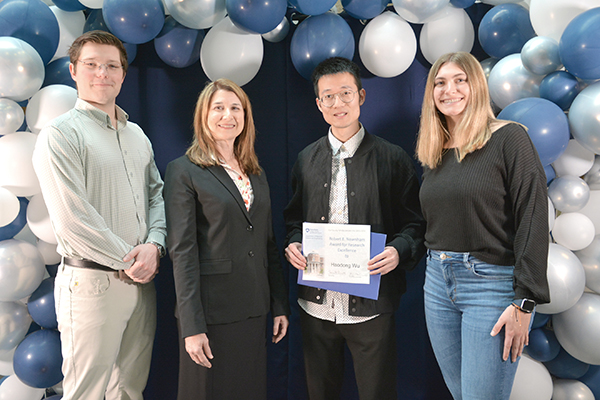
Coppola Graduate Student Award for Student Service and Leadership
This award recognizes a graduate student who exhibits outstanding leadership and service both in and outside of the program that benefits MatSE. Awarded to: Aaron Bossen, Brittney Hauke, Abbey Knoepfel, and Jensen Sevening.
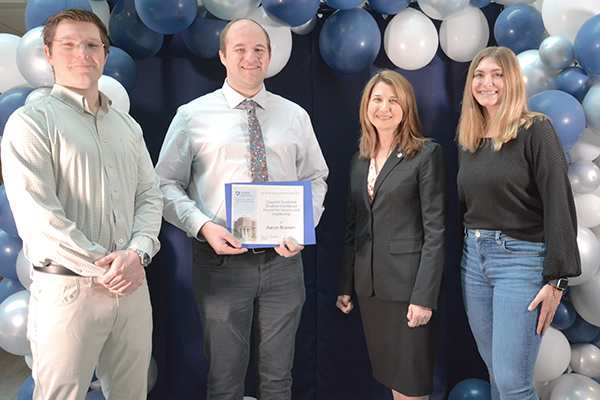
Aaron Bossen
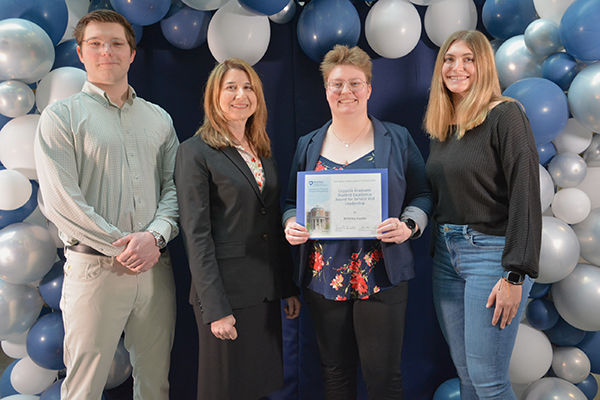
Brittney Hauke
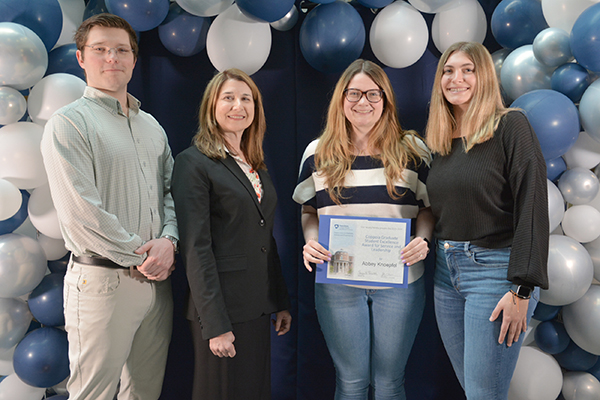
Abbey Knoepfel
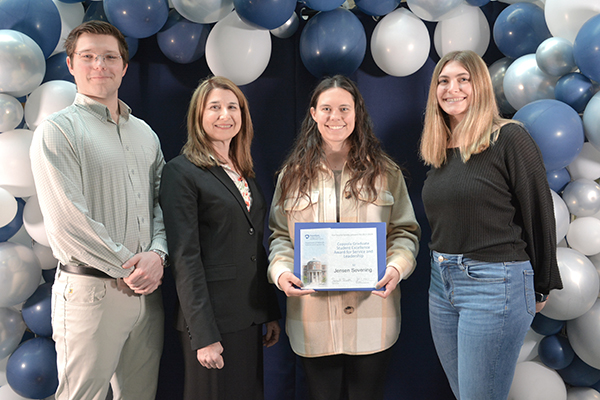
Jensen Sevening
Howard O. and Jean Beaver Graduate Studies Award
This award gives our graduate students the opportunity to enhance their communication skills and deepen their knowledge of materials science and engineering. This award recognizes six of our students for outstanding achievement as a teaching assistant. Awarded to: Sai Venkata Gayathri Ayyagari and Haley Jones .
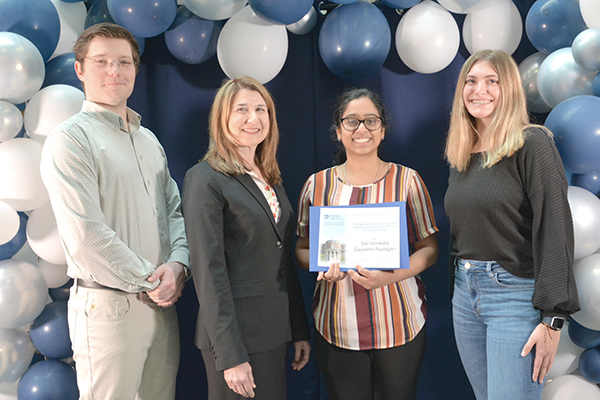
Sai Venkata Gayathri Ayyagari
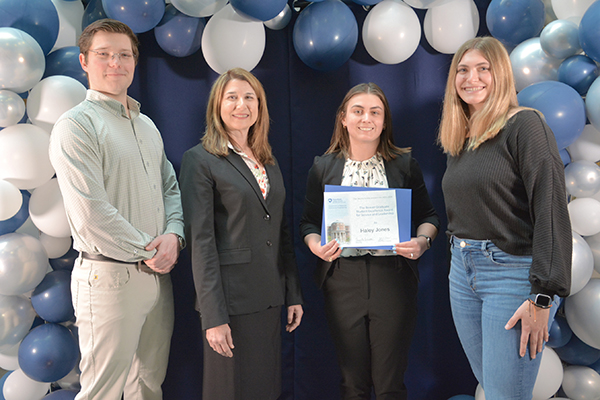
Haley Jones
Poster Competition
Click here to view winning posters.
First Place
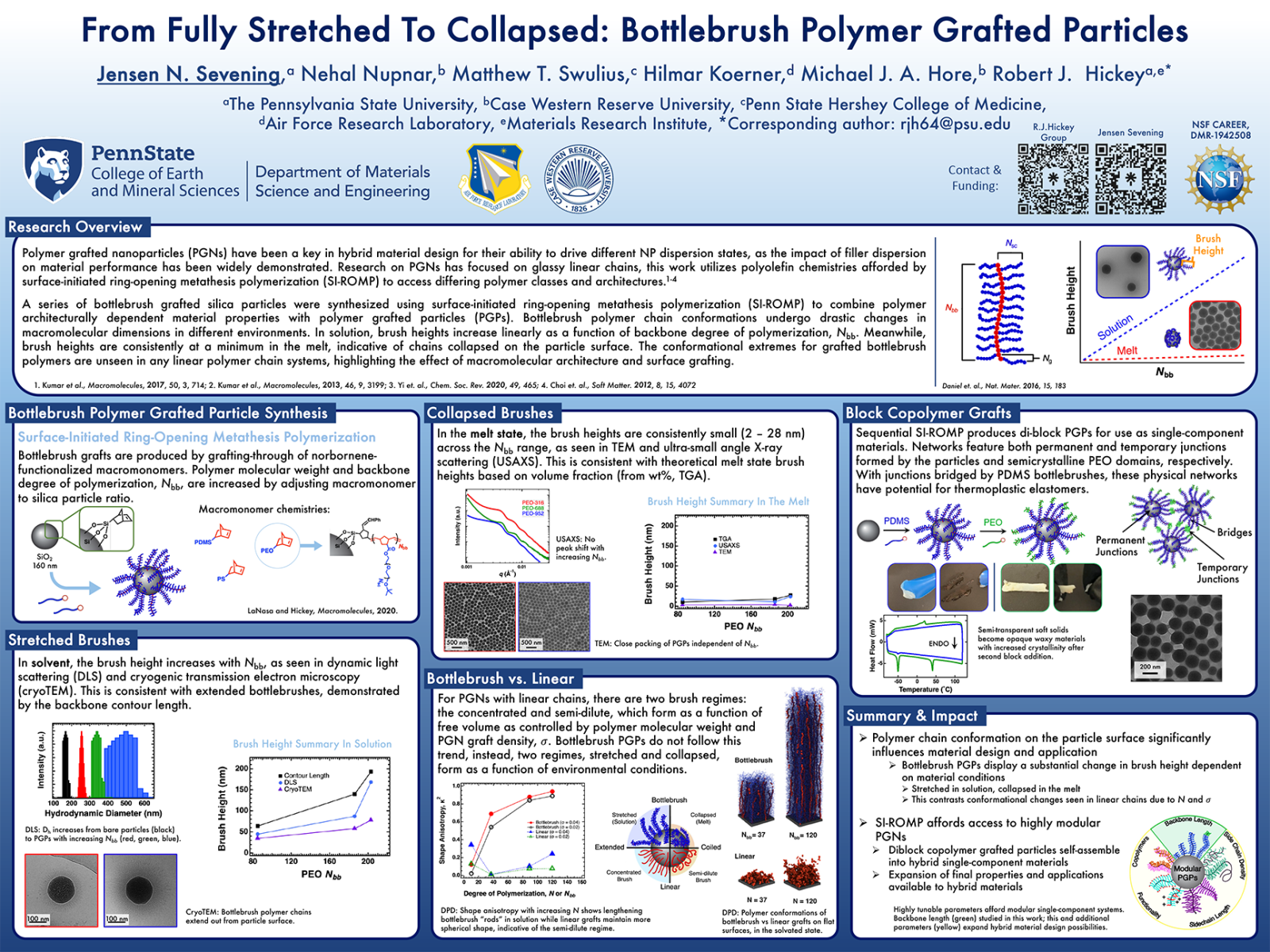
Jensen Sevening Advised by Robert Hickey “From Fully Stretched To Collapsed: Bottlebrush Polymer Grafted Particles”
Second Place
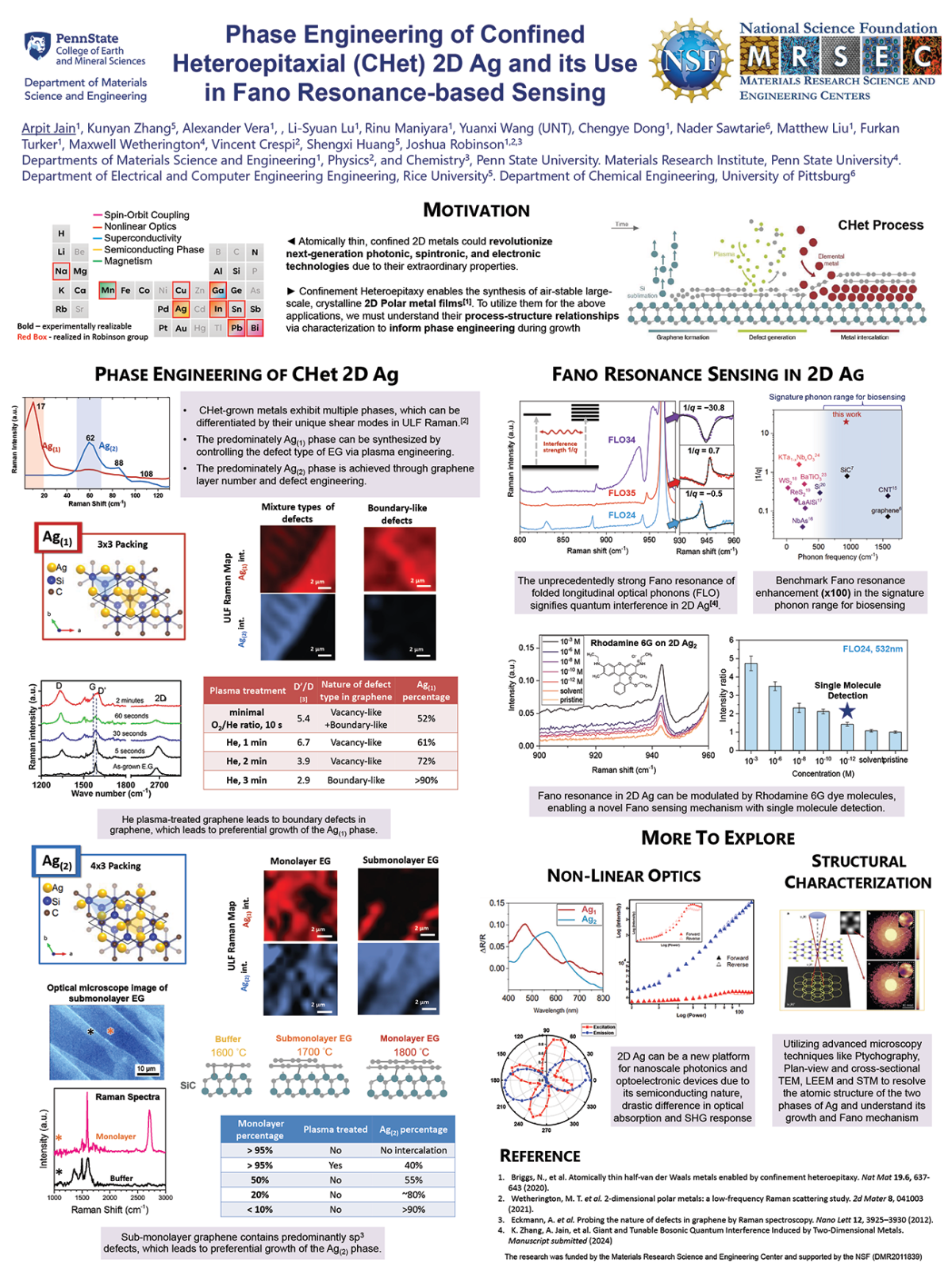
Arpit Jain Advised by Joshua Robinson “Phase Engineering of Confined Heteroepitaxial (CHet) 2D Ag and its Use in Fano Resonance-based Sensing”
Third Place
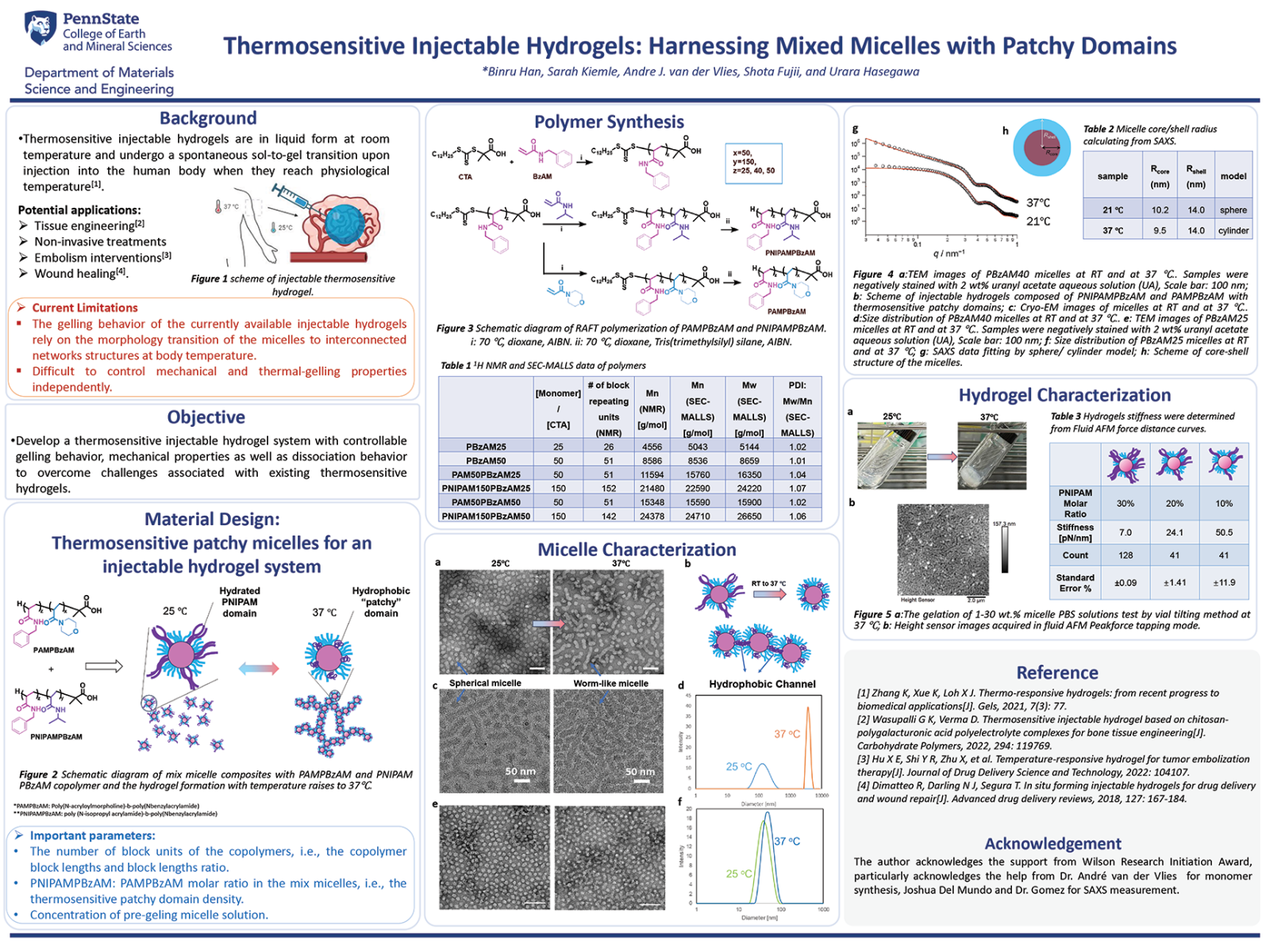
Binru Han Advised by Urara Hasegawa “Thermosensitive Injectable Hydrogels: Harnessing Mixed Micelles with Patchy Domains”
GRADUATE SCHOLARSHIPS AND AWARDS
- 3M Science and Technology Graduate Fellowship
- George W. Brindley and Jyung-Oock Choe Graduate Fellowship
- Coppola Graduate Student Excellence Fund for Student Service and Leadership
- Howard O. and Jean Beaver Graduate Studies Fund
- Helen R. and Van H. Leichliter Graduate Fellowship
- Robert E. Newnham Award for Research Excellence
- Carlo Pantano Graduate Fellowship in Materials Science and Engineering
- Shively, Weyl Crystal Chemistry Study Endowment
- Vincent F. Hock and Wanda Haschek-Hock Graduate Scholarship in Materials Science and Engineering
College of Engineering
April 22, 2024
900+ Spartan Engineering students to graduate
Alumna rachel hutter, head of disney studios operations, to give spring commencement address.

Michigan State University will host advanced degree and undergraduate commencement ceremonies for more than 900 College of Engineering graduates this weekend.
Both ceremonies are expected to be approximately two hours. There are no admission tickets required.
College of Engineering Dean Leo Kempel said he’s confident all graduates will be able to tackle the challenges that lie ahead.
“I cannot wait to see the incredible accomplishments our graduates will achieve in the years to come,” Kempel said. “My advice is to embrace every career opportunity, continue to learn and grow, and never lose sight of the impact you can make as Spartan Engineers."
Kempel will offer both the welcome and closing remarks at undergraduate graduation. Amanda Idema, assistant dean for Undergraduate Student Affairs, serves as commencement coordinator.
Ceremony dates, times
Engineering will host graduation services for 805 undergraduates on Sunday, April 28, at 3:30 p.m. in the Breslin Center.

Ashlin Riggs, a computation data science senior, has been named the student commencement speaker.
Charles Dunn, a senior in chemical engineering, will sing the Star-Spangled Banner.
Adwait Paliwal, a computer science senior, will deliver the remarks at convocation.
The Advanced Degree Commencement for master’s degree graduates is Friday, April 26, at 9 a.m. in MSU's Breslin Center. There will be 56 master's candidates from the College of Engineering.
The Advanced Degree Commencement for Ph.D. graduates is Friday, April 26, at 3 p.m. in MSU's Breslin Center. There will 78 Ph.D. candidates from the college.
Commencement livestream, social media, personal messages
Commencement ceremonies will be livestreamed on the MSU Commencement website: https://commencement.msu.edu .
Social media users can follow the ceremonies on X, formerly known as Twitter, and other social media platforms using the hashtag #SpartanGrad24.
Family, friends and fellow alums can honor graduating students by submitting personalized messages and photos to be displayed on stage prior to the ceremonies. Supporters can submit their well wishes online now through graduation day.
The link to sumbit messages that recognize College of Engineering graduates: https://app.kululu.com/nu8wd9 .
Safety protocols, parking, concessions
For the safety of attendees, no bags or purses will be allowed in Breslin Center during commencement ceremonies. Cameras and camcorders are permitted, but cases are prohibited.
No food or beverages — including bottled water — will be allowed, and this applies to graduates, guests, and faculty. Breslin Center will offer a limited concessions menu during the ceremonies.
Related links:
- MSU Commencement website
- More than 9,500 Spartans to graduate this spring
- Dantonio, influential leaders to address spring graduates
Additional prohibited items: noisemakers, selfie sticks, pets, signs and weapons of any kind. MSU is a smoke-free campus, including all outdoor and indoor spaces.

Metal detectors will screen all attendees at Breslin Center, so please plan accordingly.
Parking at the Breslin Center is limited, so the public is encouraged to use the free shuttle service.
Distinguished Alumni keynote address
Rachel S. Hutter will offer the undergraduate keynote address as the 2024 Claud R. Erickson Distinguished Alumni Award Recipient. Hutter will receive the College of Engineering’s top honor at the Engineering Alumni Awards banquet on Saturday, April 27.
Hutter is head of studio operations for Walt Disney Studios and is a licensed professional engineer and certified safety professional.
Hutter joined Disney in 1997 and was part of the team that built and opened Disney’s Animal Kingdom.
As head of Disney studio operations, Hutter’s responsibilities include planning and tracking content for Marvel, Lucasfilm, Disney Live-Action, Disney Animation, Pixar, 20th Century Studios and Searchlight Pictures.
Hutter graduated from Michigan State University in 1993 with a bachelor’s degree in electrical engineering and had a concentration in theater.
Programs available online, via mail
There are no printed commencement programs on-site at any ceremony location. However, attendees will be able to access the programs by scanning QR codes with their mobile device.
To order a program and have it mailed to you, visit the MSU commencement website. Programs will be mailed after the ceremonies.
Written by Eric Lacy, [email protected]. See more at the Engineering Media and Public Relations page.

IMAGES
VIDEO
COMMENTS
I got my PhD in Mechanical Engineering. I don't agree that it is a waste of time. Getting a PhD in engineering really depends on the job you are applying for. Your post implies your husband has a PE in EE. For the work I do (I also have a BS in EE) a PE would not be useful in my job. I know a lot of EEs and none of them have PEs and are doing ...
A Ph.D. in engineering is a research degree that provides candidates with highly specialized knowledge of a specific engineering subfield. Candidates learn about quantitative research methods and complete advanced coursework. They also conduct independent research to prepare a written dissertation and an oral presentation.
Electrical Engineering. $23,070. 2020 - 2021. MIT. Electrical Engineering. $43,150. 2019 - 2020. As you can tell, diving into a PhD in engineering might not make you rich overnight. But, hey, it does give you the chance to work on some mind-blowing research and help shape the world of tomorrow.
Equally importantly, a PhD will give you a level of job security that a lesser degree won't give you. "I have yet to find a jobless, homeless PhD in engineering. That's my simple answer," grins Thole. Not only that, but it opens up new opportunities. "The PhD really allows you to tailor your own career a bit more.
Engineering Ph.D.s provide even more specialization than master's degrees, and a higher earning potential, but they also come with significant risks, experts say. Research jobs within government ...
At Johns Hopkins University, both the Doctor of Engineering and the Doctor of Philosophy involve mentored research and in-depth investigation. There are a few key differences, though (although these are not hard and fast rules). DEng. PhD. Guiding Philosophy. Engineering practice and application. Engineering theory and scholarship.
Here's a quick list of the best PhD in engineering programs: Washington University in St. Louis - PhD in Biomedical Engineering. Duke University - Ph.D. - Civil & Environmental Engineering. George Washington University - Doctor of Engineering in Engineering Management. University of Missouri - Ph.D. in Biological Engineering.
To help you decide if the time and effort of a PhD is worth it, here are the major benefits and disadvantages of getting that doctorate. ... In the US, in fields like engineering, the difference in pay scales between employees with a master's degree and a PhD was a mere 7%. When that small bump in salary is weighed against the amount of debt ...
A PhD in Mechanical Engineering degree holder has an average salary of $110,000. This means that a PhD represents earning an average of about $20,000 more per year than a master's degree. Entry-level positions may start at around $52,000, but with experience and a proven track record, you could earn as much as $130,000.
The Doctor of Engineering (D.Eng or EngD) is a research doctorate in engineering and applied science.An EngD is a terminal degree similar to a PhD in engineering but applicable more in industry rather than in academia. The degree is usually aimed toward working professionals. The DEng/EngD along with the PhD represents the highest academic qualification in engineering, and the successful ...
The length of time to get a master's degree in engineering versus a Ph.D. in engineering differs because a master's degree is not as intensive and research-based as a doctoral degree is. Pursuing a master's in engineering takes about two years, or four semesters' worth of education. Meanwhile, those pursuing a doctoral degree in engineering ...
Is a PhD in Industrial Engineering Worth It? Yes, a PhD in Industrial Engineering is worth it, especially if you want to become an expert in your field and work in academia or research. An industrial engineering PhD also opens up new career opportunities in consulting and qualifies you for higher-paying jobs.
A PhD degree in engineering is a must! It opens many opportunities for you and your career. For instance, a PhD gives you the ability to start-up research programs, gain experience with new technologies, and become an expert in your field of study. A faculty position is also easily attainable with a PhD. Engineering positions are always highly ...
Is a PhD in Civil Engineering Worth It? Yes, a PhD in Civil Engineering is worth it. It's an excellent education path to gain expertise, specialization, and research experience in civil engineering. The research opportunities offered by PhD programs are valuable if you're considering a career as an educator or a researcher.
In fact, from a simple employment perspective those with Ph.D.s in science, engineering, and health are doing much better than the general population. In February 2013, the unemployment rate for the general U.S. population was at 6.3% while that of U.S. science, engineering, and health Ph.D.s was way down at 2.1% (7).
Hello! This is a special video, because I'm making it in collaboration with Anastasia (@AnastasiInTech, https://www.youtube.com/c/AnastasiInTech). We're disc...
1111 Engineering Drive UCB 427 Boulder, Colorado 80309-0427 ME Front Desk: 303-735-8054 General Inquiries: [email protected] Graduate Program Inquiries: [email protected] Undergraduate Program Inquiries: [email protected]. College of Engineering & Applied Science Phone: 303-492-5071 Email: [email protected]
Find out if an associate degree is worth it. Bachelor's degrees require 120 credits of coursework and can take up to four years to complete. Explore the benefits of a bachelor's degree. Master's degrees are graduate-level degrees that help you build advanced expertise in your industry or prepare you for a new career. They typically take two ...
Campbell Sweet, a PhD student in chemical engineering, has received a 2024 National Science Foundation Graduate Research Fellowship (NSF GRF). Sweet is currently in the first year of her PhD program at Mizzou, conducting research under the mentorship of Professor Patrick Pinhero. The award covers three years of a graduate program.
Yes, a PhD in Biomedical Engineering is worth it. The doctoral degree allows you to specialize in biomedical engineering and become an expert in the field through advanced coursework and in-depth research into a particular area of interest. From a career perspective, ...
Last month, research from our Network Security Lab received the winning team award for the 2024 Siemen's Tech Sustainability through Cybersecurity Challenge.PhD candidates, Amal Alshehri and Burak Tufekci, as well as Assistant Professor, Dr. Cihan Tunc, were one of the finalist research groups (out of 22 projects) and their project "OTZET: Operational Technology Zero Trust Engine for ...
Three UNH graduate students and two alumni received prestigious Graduate Research Fellowships (GRFP) from the National Science Foundation. Awarded to students pursuing master's and doctoral degrees in science, technology, engineering and mathematics, the five-year fellowship includes three years of financial support, with an annual stipend and tuition allowance.
Three Wichita State University students have secured the prestigious Graduate Research Fellowship from the National Science Foundation — an award worth $159,000 over three years. ... dean of WSU's College of Engineering. Ciletti will graduate from Wichita State with a bachelor's degree in May and will then attend graduate school. ...
Doctoral student Onrí Jay Benally is a 2024 recipient of the prestigious National Science Foundation Graduate Research Fellowship. Benally is currently pursuing his doctoral research under the guidance of Distinguished McKnight Professor and Robert F. Hartmann chair Jian-Ping Wang exploring the world of quantum computing and spintronic devices. A Navaho (Diné) tribesman and carpenter ...
Our 2024 Awards Presentation recognizes outstanding graduate students accomplishments from the academic year. We thank our generous alumni, friends and partners for making these awards possible for our graduate students. Their generosity is critical in furthering the mission of our department, and we thank each of our benefactors and scholarship donors for their continued support. For more ...
More than 900 engineering students will graduate Sunday, April 28 at Breslin Center. Michigan State University will host advanced degree and undergraduate commencement ceremonies for more than 900 College of Engineering graduates this weekend. Both ceremonies are expected to be approximately two hours. There are no admission tickets required.